#born to live in a time where shows had 20+ episodes a season
Text
And what if I said I’m going in for a third rewatch??? What then.
#born to live in a time where shows had 20+ episodes a season#cursed to live in a time that they only have 8-10#trist.txt#anyway it’s not just Carmy I’m mentally ill about it’s ALL OF EM#all of em.#I love them
3 notes
·
View notes
Text
After having had some time to ruminate about the first episode of Picard season 3 having all our favorite TNG characters be isolated from each other and not close anymore, I’m even more frustrated, because here’s the thing about making it canon that all of these characters barely spoke to each other again after Nemesis…
It makes no sense, not only within the universe of the show, but outside of it as well! Why would all of the characters come together for Will and Deanna’s wedding in Nemesis, only to hardly ever see or speak to each other again…? Picard asks after Deanna as if he hasn’t spoken to her himself for a while, and he clearly doesn’t know that Will and Deanna’s marriage is strained. He also didn’t seem to be close to Kestra, since she didn't recognize him immediately and he has to remind her why it's silly to aim an arrow at his heart, followed by him forgetting that the first time he met Thad was as a baby, only for Deanna to remind him with a photo as evidence, and then Ensign La Forge is introduced as if Picard has only kept track of her Starfleet Academy career, but has never actually met her…? Like, there’s a professional distance there, that I wouldn’t expect Picard to have with the grown child of someone who had been one of his closest friends? And don’t get me started on Beverly cutting everyone off 20 years ago! Even as the driving force of the conflict of the plot, I hate that writing choice. You’re telling me Picard or Deanna wouldn’t track Beverly down the minute something seemed fishy?? Deanna wouldn’t let her best friend just disappear, without at least trying to find her at some point in those twenty years, would she?
After all, the cast of TNG are all friends in real life! They’ve stayed friends for over twenty years after they stopped working regularly together. They went to each other’s weddings, or rather, they were in each other’s weddings, and Brent Spiner is the godfather of Gates McFadden’s son. They frequently spend birthdays and special occasions together, and when Marina Sirtis’ husband died unexpectedly, they all rushed to her side immediately for support. Then, when her birthday came around, the first without her husband, they all came together to have a socially-distanced and masked party, in the height of Covid, just so Marina wouldn’t be sad and alone on her birthday.
These people are close in real life. These people check up on each other and would never let one of their number go through something difficult alone. Why couldn’t that be true of their characters, as well?Why wouldn’t Picard keep up with his former colleagues and friends? I don’t mind that they all went their separate ways after Nemesis; I mind that now they seem like strangers in each other’s lives!
In the age of technology where you can project holograms of yourself and do the equivalent of FaceTime and Zoom across galaxies, why on earth would they be so unaware of what’s going on in each other’s lives…? Why were children born (and died) without Picard or the others knowing about it? It’s unthinkable to me that these characters would lose touch so completely.
A better story would’ve been that they make a point to come together every year for a reunion, regardless of how busy they are, and everything is all happy and joyful until Beverly Crusher doesn’t show up. Then, all of our favorite characters would already be together when the action of the show starts, and the fact that this is out of character for her to not show up to a reunion after twenty years of attending would drive the urgency of the plot.
I’m available to write for you, Paramount+, if you’re looking for a writer who actually likes these characters and wants them to be happy 🥺
180 notes
·
View notes
Text
“Cease and desist, bitch!”
News flash friends: job hunting is still terrible. Like, four months in and it’s still the worst. I finished two interview loops recently and I’m waiting to hear back and I have two others I’m trying to get through and it’s all hurry up and wait.
But then Netflix told me that GIRLS5EVA was coming to the platform, complete with a new season, and I got soooo excited.
I’m sure no one has heard of this show, it was born on Peacock and it’s a Tina Fey joint but there’s definitely a super specific audience for it which is, basically, me.
Were you born in the 80’s/early 90’s? Did you love all the random girl groups/boybands? Are you now barreling toward 40 and it’s just really depressing and terrible? Then Girls5eva is also for you.
Wherein, four millennial women decide to reunite their early 2000’s girl group after their one-hit wonder is sampled on a new hip hop track.
It’s hilarious. And really specific. And starring SARA BAREILLES who in real life is an incredible musician. Y’all remember “Gravity”? No? Even though it was featured in a Community episode where Annie cuts to a montage because she’s trying to convince everyone that she and Jeff have had a ‘will-they-won’t-they’ thing going on all year? “Gravity” is the theme of that montage!
While you’re checking out Girls5eva, also listen to Sara Bareilles. The girl is a true fucking talent.
ALSO, Busy Philipps. I LOVE Busy Philipps. And have loved her since Dawson’s freakin’ Creek and then AGAIN in Cougartown.
(Side rant - Cougartown really is a wonderful show. Terrible name, but honestly incredibly funny and there are a ton of good running jokes and it’s just fun as hell. Courteney Cox got shagged on that one, it really is a gem.)
Anyway. There are 3 seasons and it follows the ladies valiantly trying to make a comeback while dealing with being normal people again after their brief shot at fame in the early 2000’s. Which, I think we all remember fondly but was actually a pretty gross time and the show makes sure you remember that - it was not great for women by any means and it’s still not great now but Girls5eva make it work. And it’s endearing.
And y’all, some of the songs are a fuckin’ bop. BPE? Aka “Big Pussy Energy” (the club remix) is the anthem we all need right now. “Kick down the doors no locks / I don't need a key / Eyes down here, yeah, I'm the centerpiece / Animal queendom feline synergy / Kickin’ down the doors, big pussy energy!” That shit gets you in the right frame of mind. I need more semi-cheesy female anthems in my life and I’m pretty sure you do too.
Honestly, the show is really just about the fact that life doesn’t have to end after your 20’s, you can keep going after your dreams even if they’re ridiculous. And you can balance your regular shit while you do it. And you don’t need a man to define who you are. And you can leave toxic relationships if you need to. And you can grow as a person. And you can still be a crazy bitch sometimes and your friends will support you.
There’s a lot going on, and it’s all wonderful. Honestly, we need more shows about olderish female friends, with a touch of insanity. I don’t want regular female friends, I want batshit female friends doing ridiculous things.
Also, lastly, Wickie Roy is a fucking icon. In a weird way because she’s struggling to live in a normal world and she refuses to compromise and she’s an absolute nutbag but in the best way possible.
Basically, Girls5eva is making me feel better about my life. If they can get back into pop music, I can get myself another boring job and BPE is gonna help me get it done.
“Momentum yeah / um it’s our moment / we’re contenders…”

17 notes
·
View notes
Text
Venture Bros Time Frame
Based on the Venture Brothers Wiki Timeline and what I could find in the show during my final rewatch before the movie. Like when I calculated Gary’s age, this is not an opinion piece. I pull straight from the source material.
I am not starting from a specific year because we know Venture Bros references current pop culture based on the year each season was released. Various dates documented in the show fail to provide a cohesive timeline. Hence, my focus is on the time frame. I'll be keeping track by noting "Venture Bros Year _" when the series moves into the next year and by referencing years as "000(number of year)" while using dates. I suggest following along with your calendar open like I had to do while organizing this lol.
S1e11 Past Tense - Orpheus predicts that The Action Man will have a stroke in "2 years, 17 days."

We will start pretty late into the first year, Venture Bros Year 1
S1e13 Are You There God, It's Me, Dean - Takes place in late September 0001.
The episode features Monarch's birthday, which is around late September 0001 when, according to him, "the leaves would be orange enough..." to build his Monarch wings.
The Monarch butterfly migration and the leaves turning can begin around late September in New Jersey.
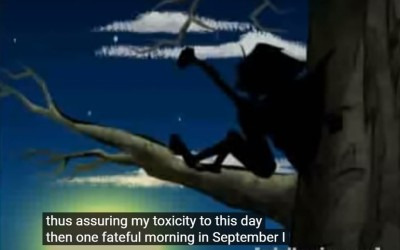

A Very Venture Christmas Special occurs on Christmas, December 25th, 0001, between season 1 and season 2.
While the entire episode was a dream, it was still revealed to be Christmas time. Sally is shown to be pregnant with Rocket. This is important because it solidifies that this episode specifically took place sometime between s1e7 Ice Station Impossible and s2e5 20 Years to Midnight.

Venture Bros Year 2
S2e2 Hate Floats - The boys celebrate their 16th birthday.
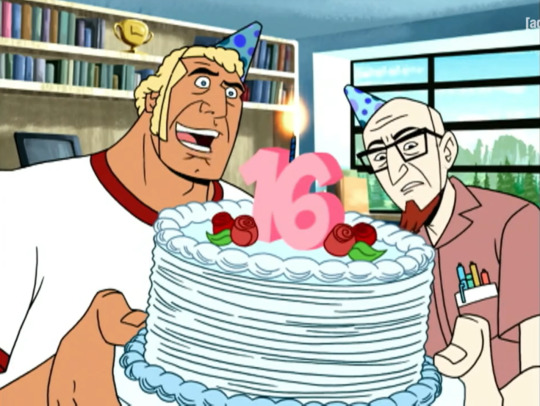
S2e5 20 Years to Midnight - This episode takes place May 4th, 0002, "...in Rusty's 44th year." In s1e8 Mid-life Chrysalis, he states his age is 43. Rusty must have turned 44 last month on April 30th, 0002. This means a little over 7 months have passed since s1e13. Rocket was born to Sally Impossible during that time.
This means the boys' birthday is between December 26th - May 3rd. I'm casting a wide net because, for all we know, the episodes in between could have happened just days apart from each other. They live chaotic lives.


S2e11 ¡Viva los Muertos! - Rusty promises the boys will receive something better than their clones as Christmas gifts.
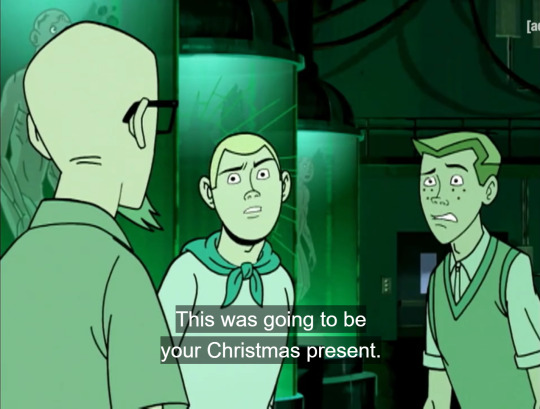
S2e12&13 Showdown at Cremation Creek (Parts 1 and 2) - This episode spans a month between the Monarch's proposal and the wedding.
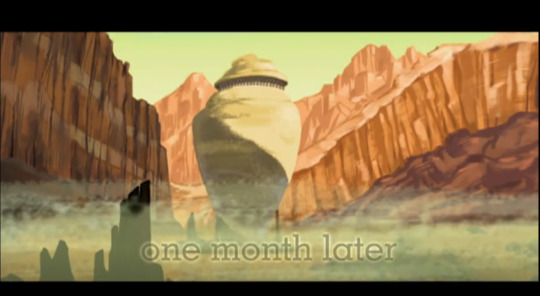
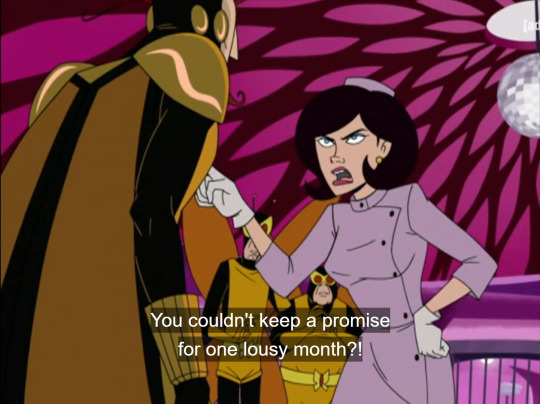
S3e4 Home Is Where the Hate Is - The boys state that they are still 16 years old "going on 17". That phrase usually indicates a birthday is approaching, but we can't assume anything definitive. What this does tell us is that a full year has not gone by since s2e2 Hate Floats, assuming the boys didn't die again off-screen.

S3e5 The Buddy System - Billy says he is 35. Based on s2e12&13 Showdown at Cremation Creek (Parts 1 and 2), we know that he is 35 at least a month after May 4th, 0002.
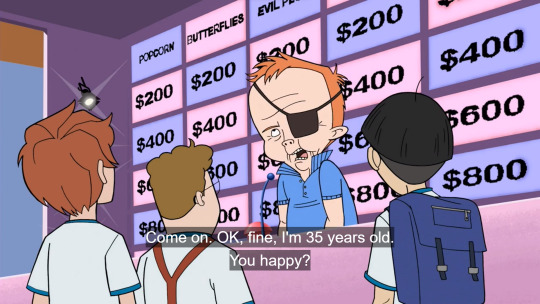
Here's where it gets tricky
S3e8 Tears of a Sea Cow - Dean's newspaper is dated May 23rd. I will explore two possibilities.
Possibility 1
Even though I don't feel like the date on Dean's paper is strong evidence as it could be a secondhand thought made up by the animators or a reference to how each season seems to occur in the year it airs, the month of May would line up as the boys had previously told Hatred they were about to turn 17 years old four episodes prior, indicating a birthday was near. If we say we are already in Venture Bros Year 3 and believe the date in the newspaper to be May 23rd, 0003, the boys would already be 17 during this episode because we know their birthday is before May 4th. However...
S3e13 The Family That Slays Together, Stays Together Part 2 - Hank says "...open my Christmas gifts early...." referring to the clones they discovered in s2e11 ¡Viva los Muertos!. Indicating that December 25th, 0002 has not occurred yet.
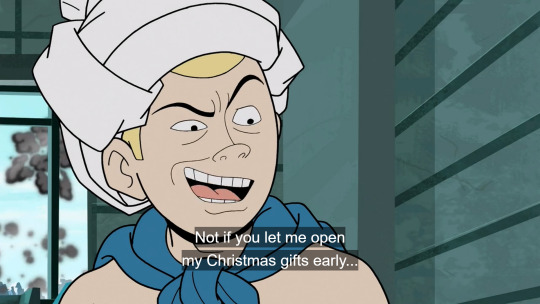
Possibility 2
What this could mean, other than an oversight, is that it was May 23rd, 0002. This would make the boys still 16 years old. And everything between s2e5 20 Years to Midnight and s3e8 Tears of a Sea Cow takes place all in one month... but that also doesn't work because s2e12&13 Showdown at Cremation Creek (Parts 1 and 2) spans about a month by itself and we see the Monarchs multiple times in various stages of their relationship throughout season 2.
Because acknowledging the date in the newspaper would not work either way, I feel that it's safe to disregard it completely based on the current information we have. I feel more confident in trusting the writing that came directly from Doc and Jackson rather than the animation.
S4e1 Blood of the Father, Heart of Steel - The Nazis give Rusty "8 months" to clone Hitler. During this time Hank grew out his hair, Brock got out of shape and back in shape, and Gary got dieseled. Somewhere during those 8 months, we moved on to…
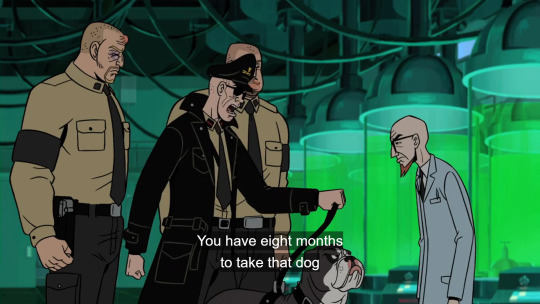
Venture Bros Year 3
S4e2 Handsome Ransom - Billy says he is 37. If Billy wasn't lying or rounding up, this means at least a year and a day have passed since s3e5 The Buddy System. The boys must be 17 at this point.

S4e5 The Revenge Society - Documenting where this episode takes place for a later reference.
S4e10 Pomp and Circuitry - Brock tells Hank "...you also have to be 18" to dissuade him from joining SPHINX. Confirming that two whole years have not passed since s2e2 Hate Floats.
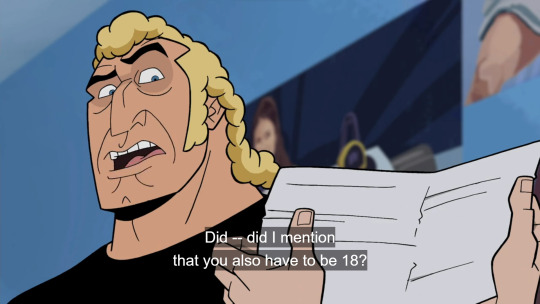
S4e12 Everybody Comes to Hank's - Hank asks Dean "How was your summer?" hinting that they are approaching the middle to end of summer.
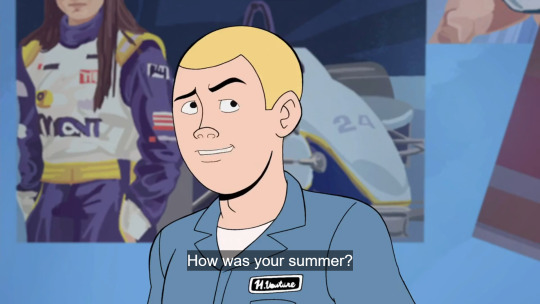
S4e15 The Silent Partners -JJ is in space building Gargantua II. This is information for later reference.
S4e16 Operation: P.R.O.M. - In the commentary, Doc and Jackson use prom to symbolize the boy's unofficial 18th birthday, more specifically their ascent into adulthood. I did not take this to mean it was literally their 18th birthday. The latest their birthday can be is May 3rd and at this point, they are nearing the fall.
S5e1 What Color Is Your Cleansuit? - Takes place the day after P.R.O.M. and spans 3 months. A Very Venture Halloween special takes place in the middle of it on October 31st, 0003. We see Gary raking leaves - Fall. Then the compound is covered in snow - Winter. The weather here is intentional to show the passage of time. It is unclear at this point if we have moved on to the next year. There is no mention of Christmas or New Year's. By the end of the episode, it could be as early as November 0003.
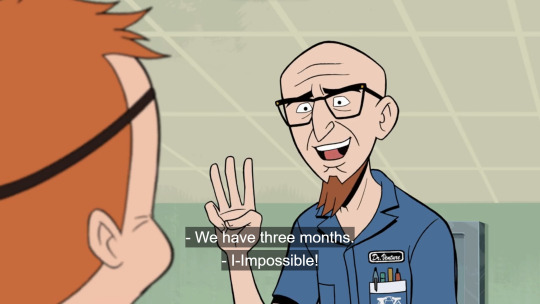
At this point, we are over 2 years and at least 1 month into the series. We started in September 0001 in s1e13 Are You There God, It's Me, Dean and are now sometime past October 31st, 0003. I am keeping in mind Orpheus' prediction of "2 years and 17 days". In the commentary Doc and Jackson state that the Action Man could have considered his health since the prediction which resulted in delaying his stroke.
S5e3 SPHINX Rising - Gary says "Hank is an adult." I took this to mean he had turned 18 at some point. While their birthday may be at the end of December because we had cast a wide net for them earlier, I will assume we’ve moved on to…
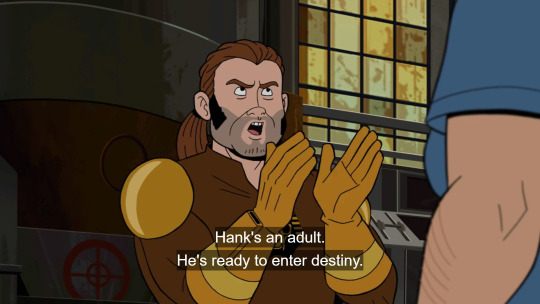
Venture Bros Year 4
Here’s where it gets tricky part 2
S5e4 Spanakopita! - This episode should take place in October. Team Venture attended the wedding of Aristotle Onassis and Jackie Kennedy which took place on October 20th, 1968. Another historical event mentioned was the Apollo 7 mission, which took place Oct 11, 1968 – Oct 22, 1968. In the flashback we see Spanakopita aligning with the Splashdown date, October 22, 1968. This is evidence that the dates are intentional.
In this episode we see Hank in his strength suit, confirming that Spanakopita takes place after s5e1 What Color Is Your Cleansuit? and A Very Venture Halloween special. I feel it's unlikely that they intended for a full year to have passed between s5e1 What Color Is Your Cleansuit? and s5e4 Spanakopita!. I want to make this as accurate as possible so I'm going to entertain two possibilities.
Possibility 1
If we say that s5e4 Spanakopita! was not intended to take place in October specifically and it was an oversight, then I feel safe to assume the warm weather we see after s5e1 What Color Is Your Cleansuit? indicates that we've moved onto spring or summer, still in Venture Bros Year 4.
S5e5 O.S.I. Love You - Hank’s limbs atrophied from wearing the strength suit he found in S5e3 SPHINX Rising for “weeks”.
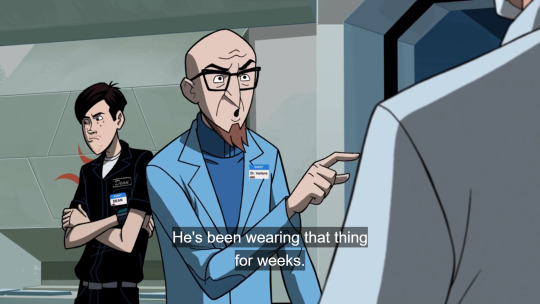
S5e6 Momma's Boys - Hank tells Dermott “Last year…” and references the events of s4e5 The Revenge Society which took place in Venture Bros Year 3.
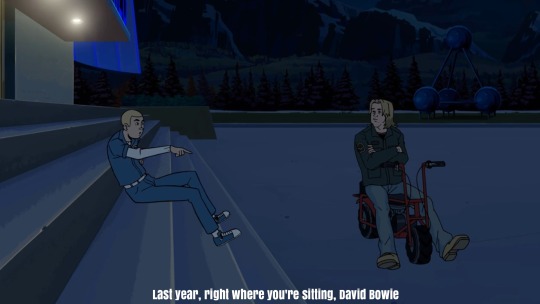
S5e7 Bot Seeks Bot - This episode takes place in July 0004. We see a flashback in S7e3 Arrears in Science which took place the night before Thanksgiving, November 0004.
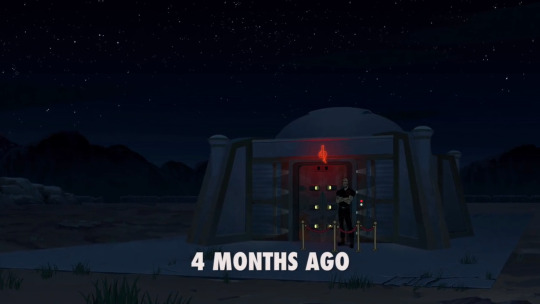
S5e8 The Devil's Grip - Dean says a third of his age is 6 - indicating he is probably 18.
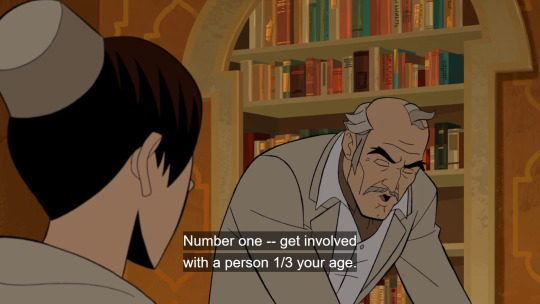
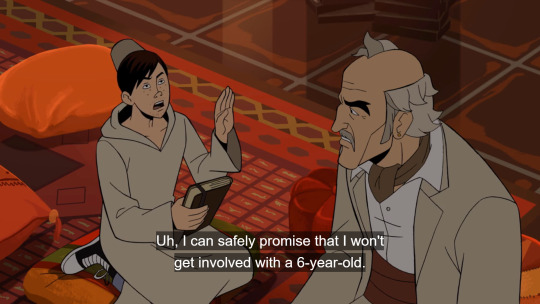
All This and Gargantua-2 - Monarch says Rusty “hasn’t paid his electric bill since June.” We know we are in July or August because s5e7 Bot Seeks Bot takes place in July 0004.
Season 6 starts in Venture Bros Year 4, August or September 0004 because we know Dean had applied and enrolled in the Fall Semester. The boys would be 18 years old—3 years since s1e13 Are You There God, It's Me, Dean.
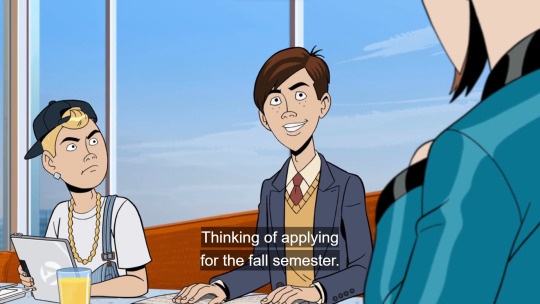
S6e1 Hostile Makeover - Hatred says he's "been waiting to do that (hit Gary) for weeks”, assuming he is referring to the last time he saw Gary in either s5e8 The Devil's Grip.
S6e4 Rapacity in Blue - Takes place on October 7th, 0004. The timestamps are in the top right corner of the security camera videos.
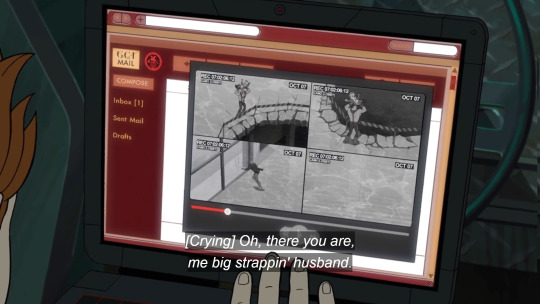
S6e5 Tanks for Nuthin’ - Takes place on October 8th, 0004 the morning after s6e4 Rapacity in Blue.
S7e1 The Venture Bros. & The Curse of the Haunted Problem - This episode takes place the in the days leading up to Thanksgiving, November 0004. We flashback 2 years ago to JJ discovering the Gargantua crash. This implies JJ made this discovery sometime in Venture Bros Year 2.
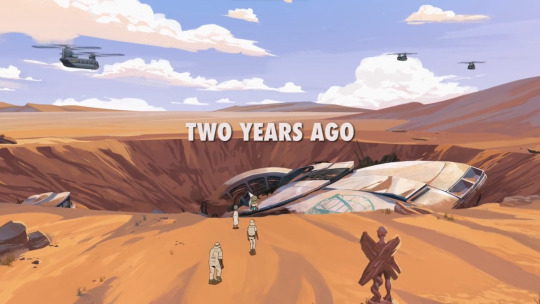
According to The Art and Making of the Venture Bros. - Rocket is 3 or 4 years old now.

Next, we have a clear time span thanks to s7e3 Arrears in Science. It's Thanksgiving, November 0004. 3 years and 2 months since s1e13 Are You There God, It's Me, Dean.
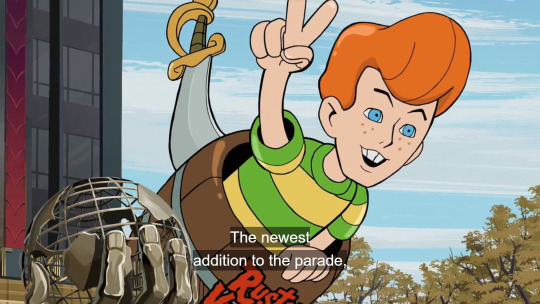
Time jump to the start of the Spring Semester in s7e4 The High Cost of Loathing, which starts in Venture Bros Year 5, January 0005.
S7e4 High Cost of Loathing - There is a "two months later" time jump at the beginning of the episode.
We are still in Winter Venture Bros Year 5 as of the final episode. In total making the time span from s1e13 Are You There God, It's Me, Dean to s7e10 The Saphrax Protocol 3 years and at least 4 months.
Possibility 2
If we do say it has been another year and s5e4 Spanakopita! takes place in Venture Bros Year 4, October 0004, which means almost everything is pushed back a year. The boys would be 18 years old.
S5e5 O.S.I. Love You - Hank’s limbs atrophied from wearing the strength suit he found in S5e3 for “weeks”.
S5e6 Momma's Boys - Hank tells Dermott “Last year…” and references the events of s4e5 The Revenge Society which took place in Venture Bros Year 3. That would mean this episode would need to take place between October 23rd, 0004 and December 31st, 0004.
Venture Bros Year 5
S5e7 Bot Seeks Bot - This episode takes place in July 0005. We see a flashback in S7e3 Arrears in Science which took place the night before Thanksgiving, November 0005.
S5e8 The Devil's Grip - Dean says a third of his age is 6 - Dean must be 19 at this point and have rounded 6 years and 3 months down to just 6.
All This and Gargantua-2 - Monarch says Rusty “hasn’t paid his electric bill since June.” We know we are in July or August because s5e7 Bot Seeks Bot takes place in July 0005.
Season 6 starts in August or September 0005, because we know Dean had applied and enrolled in the Fall Semester. At this point, the boys would have to be 19 years old. - 4 years since s1e13 Are You There God, It's Me, Dean. Overshooting the 2 years and 17 days prediction by a lot.
S6e1 Hostile Makeover - Hatred says he's "been waiting to do that (hit Gary) for weeks”, assuming he is referring to the last time he saw Gary in either s5e8 The Devil's Grip.
S6e4 Rapacity in Blue - Takes place on October 7th, 0005.
S6e5 Tanks for Nuthin’ - Takes place on October 8th, 0005 the morning after s6e4 Rapacity in Blue.
S7e1 The Venture Bros. & The Curse of the Haunted Problem - This episode takes place the in the days leading up to Thanksgiving, November 0005. We flashback 2 years ago to JJ discovering the Gargantua crash. This implies JJ made the discovery sometime in Venture Bros Year 3 before S4e15 The Silent Partners.
According to The Art and Making of the Venture Bros. - Rocket is 3 or 4 years old now.
Again, we have a clear time span thanks to s7e3 Arrears in Science. It's Thanksgiving, November 0005. 4 years and 2 months since s1e13 Are You There God, It's Me, Dean.
Finally, we have the time jump to the start of the Spring Semester in s7e4 The High Cost of Loathing, which would start in Venture Bros Year 6, January 0006.
S7e4 High Cost of Loathing - There is a "two months later" time jump at the beginning of the episode.
We are still in Winter 0006 as of the final episode. Making the time span in this possibility, from s1e13 Are You There God, It's Me, Dean to s7e10 The Saphrax Protocol, 4 years and at least 4 months.
NOTES AND THOUGHTS
S1e1 Dia de los Dangerous - Presumably this episode takes place on Dia los Muertos, November 1st. Monarch states that he's in Mexico to find his foster parents. Butterflies arrive in Mexico around early November. Because this happened before Orpheus' prediction, it could be plausible that there is almost a year between the first episode and s1e13 Are You There God, It's Me, Dean. It is probably just as likely that Doc and Jackson were not considering keeping to a set time frame until much later in the series.
JJ did not appear in the season 1 Christmas Special. The boys are alive. Rusty was not on his journey running away from the boys' deaths. I wonder if this means s1e13 Return to Spider-Skull Island took place after Christmas. I am also not considering the weather as a determining factor here because I remember hearing about issues with animating different backgrounds in the earlier seasons.
If it helps, I placed the boy’s birthday on the Ides of March (March 15th) to help me keep track of things. It’s both a significant historical date and a 70’s rock band. Plus I wanted them to be Pisces :)
I also stuck the Monarch's birthday on September 30th because that's when Don became Venturion. I think it's poetic.
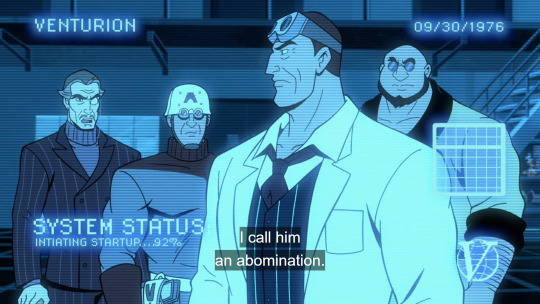
Doc and Jackson are phenomenal writers and I’m sure if they were to address this in the show they would find a way for it to make sense that we would all enjoy. I had a lot of fun doing this. I love digging deep into my favorite show and piecing together what I find 💛 Go Team Venture!
#I said go team venture but I meant Monarch crew 4 life#This took such a long time I hope it's somewhat accurate#vbros#venture bros#radiant is the blood of the baboon heart#the venture bros#rusty venture#hank venture#dean venture#the monarch#dr mrs the monarch#henchman 21#gary fischer#billy quizboy#byron orpheus
66 notes
·
View notes
Note
if you’re up to it i would very much like to know your white collar neal timeline🎤🎤
this turned out to have many asides and be very long so the tl;dr is: peter have you considered that he's just a twenty-something teenage girl :( ?
timeline:
neal born 1984 ish. he's an aries and a millennial
neal, ellen, and neal's mom go into witsec 1987, neal age 3
2003 adler scandal i fucking guess. neal age 19
neal arrested probably mid 2005, 21
neal goes to jail for the first time, i want to say early 2006, age almost 22
pilot is set late summer 2009, age 25
same-sex marriage legalized in new york june 24th 2011, they talk about this in season 3 episode 14 which is soon after. neal's 27
more or less a year later–let's go with less–neal tells sam that he has spent the last decade running from the truth he learned at 18. taking him literally that it was 10 years ago he is now 28 it is the end of season 4 and 2012
the end of season 4 to the series finale is less than a year. he is 29 its 2013.
when we see him in paris he might be 30 but that doesn't count To Me
i present my evidence:
i don't know where we got "neal is 35" from i cant make it work. neal and co. went into witsec (which i have actually since learned is not available to people living in dc, they have their own version but it is not overseen by the federal marshalls, i don't think they can give you as many legal documents like a ssn, and they don't help you set up your new life as much? something about neal's life that would be interesting to explore.) when he was three and ellen says in season 4 that she's been in witsec for Nearly three decades. confirmed 33 or under in season 4
he also says to "sam" more than once that he's spent the last decade running from the truth he learned at 18–he very well could be rounding down here and mean like 12-13 years but i am Choosing to Believe he meant that literally. we are now at youngest 28, it is the last episode of season 4.
now due to the way the show is structured and the fact that it is never really winter. ok maybe winter 1 time because i can see in my mind neal in his little wool coat and earmuffs but largely it is summer and we never have a christmas episode. anyway due to All That our only real anchor in the timeline is that the episode where diana is Grappling with her engagement to Christie happens immediately following june 24th 2011, when same-sex marriage was legalized in new york. and also that later that season in the commutation hearing they say that neal has served 2 years of his sentence. so the pilot was set in 2009 when it aired we are at one year/season. but as the series goes on the episodes and even seasons have increasingly shorter gaps between them, and by season 6 we haven't even finished our four years. by the end of season 4 i want to say we are three years into his sentence and he's 28. between the end of season 4 and when neal dies in season 6 there has got to be less than a year that passes. actually deadass why was neal so obsessed with the pink panther case ending his sentence early we are like months out king. i get the injustice the system is broken they'd keep him forever but to people outside his circle he must have looked sooo silly for that. but whatever. he is 29 when he dies and 30 when we see him again in paris, his roaring 20s of crime and incarceration over.
Anyway where the "neal is 35 or at least claims to be much older than this timeline would say he is" probably came from in-universe is that the adler scandal takes place SEVEN years before s2 when peter confronts neal about it. 2003?????? guys the thing we have to understand, to embrace, about neal's personal timeline is that i do not think anyone in that writers room was really grasping how much they had neal do in so short a time. 2003 he is like 19 guys. maybe by the time peter says it was 7 years ago it was 2011 ? and the adler thing was 2004? but no that couldn't work because it's mid 2011 like a year later in s3. so basically neal walks out of st louis and has a magical girl transformation through which he immediately becomes a great conman and criminal. and he meets mozzie basically straight away. he should still be in like calculus and ap lit at this juncture. and then they go right into the adler con ??? and neal is obviously lying through his teeth to everyone saying he is at least 21 but probably more along the lines of 23. and while most of his aliases are eventually found out by peter if no one else, no one ever goes "wait IS HE a teenager?" no one is guessing this.
so we spend a couple months fucking around and fucking UP with adler, kate probably doesn't know how old we actually are, this relationship cannot actually last very long at all because we are truly on a time crunch right now. we have less than three years for neals entire criminal career before he goes to jail. i know i said on the bullet list he went to jail early 2006 he has got to have been arrested like summer 2005 at the latest to be tried and sentenced by then and i feel like even that might be tight because he was suspected of so many other things they wanted to get evidence for. but how is neal teaching kate to be a criminal less than a year into his own career. i think neal must have been a hardcore improv kid for this to work honestly. i bet he competed. so our golden days of mozzie neal and kate against the world lasts maybe a year at best before neal and kate fight and she leaves and he spends months trying to get her back and get her attention and commits a truly breathtaking amount of crimes in this time.
also i'm skipping through forging bonds right now trying to flesh out this timeline and it was incredibly shady of peter and co to see that kate is doing so much to stay hidden from her ex boyfriend and then to reveal her to neal in order to catch him. like that was fucked up they didn't know neal yet he hadn't been suspected of violent crimes but they didn't know why kate was working so hard to escape him. like it worked out ok (arguably, but that could be a different post) but they had no reason to trust neal not to hurt her like this. she could have been running from an abusive situation he's known to be a talented criminal with no fears about escalating his crimes he could have killed her. one thing about the fbi is that they never once care about kate's safety and it does indeed get her killed one day.
in conclusion neal is known as one of the best forgers in the world when he is arrested in 2005 at age 21 maybe 2 years into his criminal career. here i am 21 what have i accomplished
#hiiiiiii LOVE your wc fic explorations of neals childhood are everything To Me and really your characterization of danny brooks is exactly#the kind of child neal would have to be for him to have been essentially a child prodigy at white collar crime#truly hes gotta be canon#also one more thing why is james in that flashback like have a good day at school 🥰 or whatever. neal is 2 or 3 and his mom didnt seem#to work so he didnt have daycare. where tf is he going#anyway thank you for coming to my ted talk future talks will discuss my conflicting opinions on how neal and kates relationship is treated#in canon and how neal was obviously not an early 2000s emo kid but frankly? maybe he should have been. good night#white collar#poplars.txt#just put this throufh a word counter 1200??? sorry.#this post is nearly twice the word count of the assignment i was procrastinating while i wrote it 🧍
6 notes
·
View notes
Photo










Happy Birthday Scottish actor David McCallum born 19th September 1933.
Born as David Keith McCallum, Jr in Maryhill, Glasgow, the second of two sons of Dorothy Dorman, a cellist, and orchestral violinist David McCallum Sr. When he was three, his family moved to London for his father to play as concertmaster in the London Philharmonic Orchestra. Early in the Second World War, he was evacuated back to Scotland, where he lived with his mother at Gartocharn by Loch Lomond.
McCallum won a scholarship to University College School, a boys’ independent school in Hampstead, London, where, encouraged by his parents to prepare for a career in music, he played the oboe.In 1946 he began doing boy voices for the BBC radio repertory company. Also involved in local amateur drama, at age 17, he appeared as Oberon in an open-air production of A Midsummer Night’s Dream with the Play and Pageant Union. He left school at age 18 and was conscripted, joining the 3rd Battalion the Middlesex Regiment, which was seconded to the Royal West African Frontier Force.In March 1954 he was promoted to Lieutenant. After leaving the army he attended the Royal Academy of Dramatic Art (also in London), where Joan Collins was a classmate.
David McCallum’s acting career has spanned six decades; however, these days he is best known for his starring role on the police procedural NCIS as medical examiner as Dr. Donald “Ducky” Mallard. I first really remember McCallum for his role in another US show, The Invisible Man which ran for 13 episodes in the 70’s. McCallum by then was a veteran of many TV and Film roles, starting in the 50’s including Our Mutual Friend and The Eustace Diamonds, in the 60’s he was in several ITV Playhouse shows before moving across the Atlantic to take roles in The Outer Limits and his big break as Illya Kuryakin in several incantations of The Man from Uncle.
His most notable films were The Greatest Story Ever Told as Judas Iscariot and of course Ashley-Pitt ‘Dispersal’ in The Great Escape.
As well as the aforementioned Invisible Man in the 70’s he took time to pop back over to our shores to star in two quality series, as Flt. Lt. Simon Carter in Colditz and Alan Breck Stewart in an adaption of Robert Louis Stevenson’s, Kidnapped.
The 80’s saw him team up with the lovely Joanna Lumley in Sapphire & Steel and several guest roles in the likes of The A Team, Hart to Hart and Murder, She Wrote as well as a one off reprise of Illya in the TV movie The Return of the Man from U.N.C.L.E.: The Fifteen Years Later Affair.
The 90’s saw David in Cluedo and Trainer on our TV screens over here and American science-fiction series VR-5 in the states..
During the last 20 years or so he has been in the kids TV show, Ben 10: Omniverse as the voice of Professor Paradox and of course Donald Horatio “Ducky” Mallard in a remarkable 436 episodes of the popular NCIS.
David has been married twice. He married his first wife Jill Ireland in 1957. They met on the set of the movie Hell Drivers. Together, they had two sons and a daughter, Paul, Jason and Valentine, with Jason being the only one who was adopted. In 1963, David introduced Jill to his co-star on The Great Escape, Charles Bronson, and she left David and married Charles in 1968. In 1967, David married Katherine Carpenter and they have two children together, a son Peter and a daughter, Sophie. He and Katherine currently live in New York.
With the series NCIS approaching its milestone 20th season, David recently explained why fans have been seeing a little less of his character in recent years saying he began to feel Ducky was becoming “redundant” to the show. Thankfully, he wasn’t gone from the team for good and decided to stay on as a historian for the NCIS. McCallum has since confirmed the change occurred after he had started making plans to leave the series.
“Now he’s retired, I sort of realised the character was becoming a little redundant,” he explained.“I sort of decided to leave the show, and they said, ‘No, we’d like to make you the historian so you’re still a part of the show’.”
Good luck and happy birthday David, I look forward to writing a post next year on this day when you turn 90.
50 notes
·
View notes
Text
Family history, records, and Carmen's journey of self-discovery

From the last episode of season 2 of Carmen Sandiego.
This post, a bit like the bast one, which focused on Futurama, looks at the second season of the new animated show, Carmen Sandiego. [1] As a warning, for those that have not watched the episodes of the new season, or perhaps even the first season, this post discusses spoilers from the show itself, just to give you a heads up. The show is set, clearly, in our existing world, not in some magical world. Without further ado, let's dive in and discuss the interwoven threads of records and family history.
Reprinted from my Genealogy in Popular Culture WordPress blog. Originally published on July 28, 2020.
In the show's first season, we were introduced to Carmen Sandiego, the code-name of a 20-some Latina woman, an international master thief who stole from thieves, especially in that season's first two episodes. Despite the fact that we as the audience knew that she had previously been a part of V.I.L.E. (Villains International League of Evil), her background was relatively obscure. She had been born in Argentina presumably and only had a set of "matryoshka dolls" as her possessions, with the story that she was found by the roadside near Buenos Aires. Perhaps purposely, what is revealed about her past is piecemeal, contrasting from shows like Futurama where family trees, although non-traditional, end up being somewhat central. Carmen, who also goes by the names of "Red," "Black Sheep," "The Lady in Red," "Fedora the Explorer," "The World's Greatest Thief," "The Miss of Misdemeanor," "La Femme Rouge," and "The Crimson Shadow," among others, has no memory of her parents and grew up on V.I.L.E. Island, which is somewhere in the Canary Islands.
While her narrative in this show differs from those in previous iterations, you may think that perhaps she had Russian ancestry. As it turns out, some Russian Argentines immigrated in a sizable number from 1901-1920 if my translation (via Google Translate) of this publication is right. There were also specific colonies of Russian-German immigrants who settled in Argentina starting in the 1890s in agricultural areas. There's also 10,000 inhabitants in Choele Choel, including Russian Orthodox immigrants, sometimes called the "White Russians," who came from Russia itself. Others have noted that there were five immigration waves from Russia to Argentina since the end of the 19th century. Presently, hundreds of thousands with some people of Russian descent living in Argentina. On the other hand, the dolls themselves are deceiving as they may not indicate ancestry at all!
The latter brings us to the most recent season. Like the first season, there isn't much focus on her family roots at first. Carmen is at a bit a dead end. Shadowsan, who rescued her from Argentina, whom has Japanese heritage, says he doesn't know much about the mission, with little he can tell her. She accepts this for the time being and makes an interesting remark at the end of the third episode of the season, "The Daisho Caper":
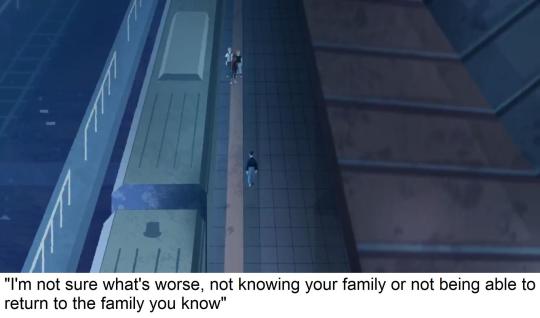
Of course, discovering herself and her identity are important themes of the season. Even stronger is the continual use of records. Carmen's hacker friend, "Player," breaks into V.I.L.E. hard drives from his home computer to figure out what capers the evil organization is plotting and how Carmen can stop them. Apart from that, in the last episode of the season, "The Deep Water Caper," which ends the show not only on a cliffhanger but with a big bang, Carmen specifically references records and finding out the truth about her family. This is NOT the way to manage your records, people, seriously. Blowing up your headquarters and having it sink into the water is not a way to erase records. I mean, they didn't even do a good job, because she still found the files.
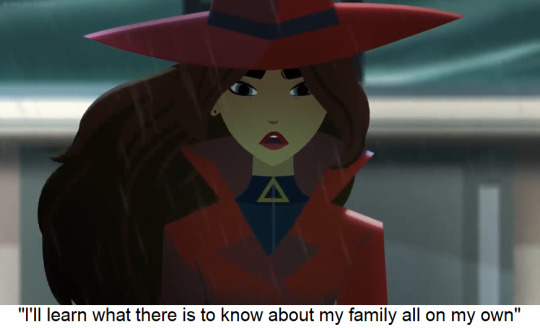

And because of that, this episode is perhaps my favorite of the whole season. Unfortunately, we don't see the server room since the V.I.L.E. faculty literally destroyed the whole academy, but she swims through the water and retrieves the necessary records. From this, she is able to learn more about her past and finds the case files. It shows that her nemesis, Coach Brunt was right when she taunted Carmen in the previous episode about Shadowsan: he was on a mission to Argentina to kill a man named "Dexter Wolff," obviously a code name. But other than the fact that Wolff was V.I.L.E. faculty, it doesn't say much more. She then decides to confront Shadowsan, presumably in their new headquarters in San Diego at the former "Carmen Outer Wear" company building. Telling him that she won't let him escape, he says he is not going to run and will tell her everything. So much for following Carmen's instructions when she, during the "Daisho Caper" (and in some of the prior episodes) to have no more secrets. He claims he didn't tell her the truth for his own protection.
The fact that Shadowsan, the creator of the record Carmen found, did NOT tell the full truth in the record itself, relates to a lot of archival themes. For instance, you could say that Shadowsan's report is a primary source, but since he left out certain content is almost an archival silence or "gaps or missing pieces in the historical record" to quote from the Guidelines for Primary Source Literacy. As such, he is engaging in a form of bias, as he is engaging in a "prejudice in favor of one thing or person over another," specifically in favor of Carmen. Furthermore, records themselves can "easily become lost, distorted, or orphaned" as archivist Samantha Thompson points out. There have often been distortions and omissions in records, like those in Early Modern Europe, records left by the so-called "Founding Fathers" of the U.S., or within family archives, meaning that in this sense, Shadowsan's action not unique. Due to the omissions from the report, Carmen was right to challenge its accuracy, as the latter means, in an archival context, "the degree to which data, information, documents or records are precise, correct, truthful, free of error or distortion, or pertinent to the matter." It actually reminds me of those 1990s Hollywood films I reviewed a while back which often had themes about records erasure.
Now, here's where it gets interesting. Shadowsan says he went to Argentina to track down Wolff and followed him to a villa outside Buenos Aires where he found Carmen, complicating his plan to kill him. As he was about to carry out his dirty deed, another group of law enforcement, presumably INTERPOL (explaining how she can connect with Devineaux and Julia so easily) approached, ready to take him down. As he tried to escape, a young Black female agent named Tamara Fraser shot him down (maybe she thought he was pulling out a gun?). She later used this leverage to form a special investigative unit, A.C.M.E., implied to be part of INTERPOL. This means that the 'Chief' killed her father. No wonder she feels no compunction in hacking A.C.M.E., tricking the Chief by giving her a phony V.I.L.E. hard drive. Within, Player finds the file which gives the real name of the Chief (Tamara Fraser) and shows her taking responsibility for the act. Interestingly, the presence of Shadowsan and Carmen there is not recorded, so A.C.M.E. has no idea she is the son of a person their Chief killed! The episode goes on for Carmen to unearth the casket of the person who owned the house, a woman "Vera Cruz," which turns out to be a decoy, allowing her to vanish "without a trace." As such, Carmen doesn't know the name of her mother, although she holds out hope, as the episode closes, that she is out there and she will find her someday, saying: "everyone leaves a trace. Somewhere out there I have a mother who may or may not know I am alive" with Shadowsan with her until the "end of the line," declaring "then let's find her." On a related note, as viewers, we learn, through deduction, from the fake coffin that the coffin was planted in 1999, and this show having been set in the present day, that Carmen is at least 20 years old, if not older.
In the meantime, A.C.M.E., due to the hack, re-activates pompous fool and chauvinist Chase Devineaux. Of course, they had been trying to track Carmen and catch her in order to learn more about V.I.L.E., but it had been pushed by Julia, the former partner of Chase at INTERPOL, that they try to recruit Carmen. All goes well except in the process Carmen is hurt badly after escaping A.C.M.E.'s clutches in the Stockholm Caper episode. After learning this horrible truth about the Chief, it seems abundantly clear Carmen isn't going to trust them again. Why would you trust a person who killed your own father? So, I expect some sort of showdown between Carmen and A.C.M.E. or just Carmen and the Chief in the next season, if I may make a prediction.
With all being said, what can we say about the show and its themes of records and family history? Clearly, this season was much stronger in the latter theme, as the former has been a staple throughout the show itself, along with a continued focus on the use of records to halt the actions of evildoers. There is also a strong emphasis on discovering who you are, which is also present in shows like Steven Universe and Revolutionary Girl Utena, both of which I have reviewed on this blog in one way or another. It also makes me think of the 1990s show, Where on Earth is Carmen Sandiego? where some parts of her family life are revealed at the end of the show's run. While I hold out hope that Carmen will go to a library or archives in the future, even if she does not, the show still has staying power and shows that you should pursue a focus on your family roots. That seems evident in the upcoming season.
© 2020-2023 Burkely Hermann. All rights reserved.
Notes
[1] When I originally posted this in October 2019, it fulfilled a promise I made back in June to write about the show. I also talked about it back when I had my DNAChat, you know the Twitter discussion I did back in late June. If you need a refresher, I recommend you check out "Last two days of #DNAChat," "DNAChat Questions," "#DNAChat Day 5," "#DNAChat Day 4," "#DNAChat Day 3," "#DNAChat Day 2," "#DNAChat Day 1," and "Tweets introducing #DNAChat." As I pondered what to do next, although I'm not completely convinced I want to do a chat on Carmen Sandiego, DNA, "Resistance Genealogy," racial justice, or archives/libraries topics, although I may change my mind in the future. During the chat, I even asked a question on one of the days, although getting her age wrong, saying that Carmen knows little about her past, and asked participants if DNA test would help her and what they would recommend she do.
#carmen sandiego#case files#family history#genealogy#popular culture#reviews#futurama#latina#latinas#argentina#russian descent#immigration#hackers#databases#where on earth is carmen sandiego#revolutionary girl utena#steven universe
7 notes
·
View notes
Text
Is this still a medium or am I old?
Anyone else feel aimless? (I ask this as though one single person will see it/read it/respond/care?...but just go with me.)
I, per usual, am steeped in nostalgia. I just spent the better part of my night listening to Little Earthquakes by Tori Amos, followed by Ray of Light by Madonna. I’ve been watching old movies like Mystic Pizza and re-watching early seasons of Real Housewives of NY, doing it all from my bed, on my computer instead of the relatively new, nice, big TV downstairs. It’s as if I’m 20s Alison, alone in my apartment in New York, watching tapes of recorded-from-tv episodes of Friends and Sex and the City on my 12″ TV/VCR combo, purchased in 1996 when I went to college. It’s purposeful, in a way. I’m indulging. I’m going back to 20s Alison—even teenage Alison, watching TV at one in the morning when I couldn’t sleep, discovering Fiona Apple on MTV or laughing at first-season episodes of Saturday Night Live from before I was born. I have these comforts; music and media that touches a part of me that is stuffed away from the rest of myself. The part that felt the promise of the future. The part that had time to sit in that promise and that hope. Time to feel every bit of sadness, drama, anger, self-righteousness, self-loathing, ambition, heartbreak and, despite it all, optimism. There was so much time. It was safe. It was heavy, but it wasn’t real.
Or I just didn’t realize how real it could get.
I’ve wanted to write into this void many times over the last few years. Whenever I’ve attempted, I usually get caught up reading old posts; connecting with a part of my life from 15 years ago, for which I’m grateful there’s documentation. My early days of my marriage, my time before kids, my time with babies—really, my last time as only me. Again, there was time. Now it’s five minutes here and there...the rest tied up in tasks and life that is decidedly much less self-indulgent. There is no time to create anew. There is time to reread/relive/remember. Nostalgia is a drug for 40s Alison. It allows me to feel. And I feel so much.
I can’t quite articulate the emotions that bubble up when I listen to music or watch shows/movies that I connected to deeply—or even not that deeply. I don’t recall being super into Little Earthquakes, yet I can experience teenage Alison listening to it...feeling every bit of Me and a Gun despite not knowing any version of that kind of violence (even still, thank god). And tonight, after listening to that and Ray of Light, I dabbled in watching old Janet Jackson videos, namely for If. I had to see that iconic dance. I had to relive the wonder of watching Janet, gorgeous as ever, doing a dance I would pause and rewind and freeze frame and slow-mo for hours trying to learn. The nostalgia drug reminded me—I was a kid once. I was a kid who spent hoooooouuuuuuurrrrrrrs dancing. I was a teenager who took herself and the dances she choreographed way too seriously. I was not that good of a dancer, but goddamnit I believed I could be Janet.
I’m 44 now. I’m tired. I’m decidedly middle-aged. I was at Georgia’s dance recital today, watching my now eleven year old on stage. I sat next to a young mom, squealing in delight at her tiny daughter doing ballet in front of an audience. I was that young mom with her tiny daughter at her first recital eight years ago. Where did it go? Why don’t I remember enough of it? Why do I miss it so much?
How has it gotten so hard to keep time?
I want to write more music. I want to interview people I find interesting and find out where their time goes. I want to sit and do nothing. I want to do more. I want to do something that counts. I want to do something meaningful. I want to do things right and well. I want to make my family proud. I want to be present. I want to be anywhere but here. i want to be alone. I want to be with people. i want to be responsible for myself. I want a puppy. I want to teach my kids every possible life lesson.
I want. I want. I want.
Where to begin?
5 notes
·
View notes
Text
Velma is bad, but...
Look.
The show is not good.
The memes are god tier.
I’m gonna keep watching it.
So here’s my complex opinion on the matter.
I’m not watching it through official means so HBO is not getting any ad or sub revenue from me. I don’t pirate video games, but I do movies/shows/music because it’s easier and less time consuming.
I was never a massive Scooby fan. The original cartoon predates me by an entire 20 years (1969 - I was born in ‘89). I’ve always known about it, it’s been in the peripheral of my media consciousness for my entire life. I think I saw one of the Live Action movies (the 2002 one, I was still in school). I probably caught a few episodes in my cartoon watching days but I’ve never been a puzzle solver and the “whodunnit” angle never grasped me.
So I don’t have the nostalgia that the rest of the world seems to have, but I recognize character assassinations when I see one.
I admit I don’t hate Velma as much as the rest of the internet seems to.
I like the art style, admittedly. However I’ve caught some brief scenes where it looked rushed and less detailed and they just went with it.
I actually quite enjoy the hallucinations, though they got a little less creative in episode 3 and 4 but they were also not a major focal point of the plot in either episode.
Some jokes DO land. Some. Some jokes land, and then they turn around to ruin it. When Fred was taken to trial and the family tried to play up his innocent young boy shtick, they could have milked that for some real humor but instead he got water splashed on him and they went for a pretty low-bar Hitler joke instead. It was so close to a good joke.
I’m not fond of the meta humor. I don’t like it when they made a dig at “adults watching cartoons”. Like bitch, this is a cartoon marketed towards adults. Why is there contempt for your target audience?
And I’m a liberal, a leftist. I can handle some digs in our direction. GTA seems to do it the best, I had a giggle at the in-universe cartoon they had of the hero “Impotent Rage!”, making fun of Democrats ability to never really get anything done. I get the joke, it’s clever, it’s satire.
But when characters in media stop the plot, and turn to the camera to complain about the patriarchy or whatever it irritates me. We all know the patriarchy is a thing. How about you have something clever to say.
Episode 4 is a complete derailment of the plotline just to talk about women’s empowerment through attractiveness. The whole episode is just Velma figuring out that women’s empowerment can take different forms. It’s a fine message, but brought to us in a clunky and frankly, kind of annoying method. Especially since there’s supposed to still be a murder-mystery happening.
Derailment is a thing that happens a lot in episodes 3 and 4. I didn’t hate episode 3 at all on its own. The first half had a lot of jokes I had a giggle at but it was just meandering around the plot to stop and figure out what Velma’s sexuality is (still inconclusive as of episode 4). I don’t mind a slow burn romance but fucking sort your shit out, show.
I am “ehhhh” on Velma.
I kinda like Daphne.
I’m okay with Norville. He seems to be the most consistent source of jokes that don’t turn around on themselves.
But Jesus, what they did to Fred should be a media crime.
It’s just one of these situations where I feel like there’s some potential quality here buried under some really dogshit writing.
I will not argue for a second that this is not a good show and I don’t think there’s anything any future episodes can do to retroactively “fix” the problems already present. I feel like a season 2 might have to do some heavy lifting (because I think I read somewhere that it’s already greenlit?)
I still remain somewhat fascinated by it and I’m more curious to where the plot is going if it can stop stopping itself to turn towards the camera and stop hating on literally every viewer.
4 notes
·
View notes
Note
Thanks for the questions you sent me, here's some for you! 2, 9, 10, 16, 20, 25
Hey! Thanks for the questions. Sorry for taking so long to get back to you. I was working on a screenplay for a contest, and the deadline was fast approaching and soon we shall tip the scales of life. But without further ado, here are my answers:
2. What is your favorite episode of your current favorite tv show?
Hmm, that's hard to say. Many of the shows I like have been canceled (some long ago, in case this blog is any indication haha)! I guess since I just tweeted about it, I'll have to say Rosa (Doctor Who, Series 11, Episode 3).
9. Did a Disney movie come out the year you were born? Which one?
Yes, several. The first one that comes to mind is Pocahantas.
10. If you could sit one person down and ask them an unlimited amount of questions, talk-show-style, who would it be? What would you ask?
That's easy. Adam Young of Owl City. Considering what just happened in that fandom, I'd ask him about the recent ARG and what was going through his mind when he was kicked out of his own Discord server? (Long story... We love you, Birdman!)
16. If you could cause the sequel to any book to magically come into existence, which would it be?
Another tough one. I don't read all that often, and when I do read a book, it tends to be non-fiction. Even then, my favorite fictional book growing up was The Giver by Lois Lowry, but that's a part of a tetralogy, and I've only read the first book. Can I will a novelization of HOA season 3 into existence?
No, although it's not a book, if you don't mind, I'd like to will a sequel to a movie into existence. And I will a sequel to the Disney Channel Original Movie Minutemen into existence. I mean, the sequel hook is right there: Charlie figures out how to teleport at the end of the movie, but nothing comes of it? I'd love to see how that turns out!
20. What fictional world do you most want to live in?
As crazy as it sounds, I wouldn't mind going to live in Anubis House. I'd love to be a part of Sibuna (or at least friends with them)! Close alternatives would be the Whoniverse or the Island of Sodor.
25. What is the wildest dream you’ve ever had?
I've had several! But my most recent one (which was a few months ago) had me working on a stage for a show. (I'm 95% sure there was something involving an old school I went to earlier in the dream, but I can't remember anything about it.) It was the same stage that most of my dance recitals were held on, and while my dance teacher was there, it wasn't a dance recital. This part of the dream is a bit hazy as it was a while ago, but I remember doing something for a show that was going on, and things weren't exactly going according to plan. One minute, I was on the stage as a performer of some sort, and in another, I was doing some sort of behind-the-scenes work. All I know is my dance teacher, for whatever reason, was upset and frustrated with me.
Then, the auditorium effectively changed into a courtroom. (By that, I mean its physical appearance didn't change, but it somehow became a courtroom). And I'm not talking about any courtroom, oh no! It was the courtroom where a very particular fictional criminal trial was about to have its verdict read.
Now, to understand why, I need to explain something that happened in my waking life... I got (unintentionally) hooked on a soap opera! Specifically, General Hospital. Around the time of my dream, the show was in the middle of Trina Robinson's trial. Long story short, she was framed for filming and distributing a certain kind of revenge "video" without permission. I don't remember how close we were to the verdict in the show (we had to be pretty close, though). But in my dream, the verdict was rendered. Without giving anything away, let's just say that my dream's version of events and the actual show's version of events had different outcomes.
But I was now at the trial, witnessing all that was taking place. I was apparently friends with Trina and her friends, and somehow, the dream changed again to me riding in a car with Trina's friends discussing the case. Shortly after that, I woke up, and all I can remember thinking was, "What the heck did I just dream?"
---------------------------------------------------
Anyway, thanks for the questions!
#house of anubis#owl city#doctor who#general hospital#way too many other things I could possibly tag#But I had fun answering these questions!#Again#Sorry it took so long to get back to you#Thanks for asking!
4 notes
·
View notes
Text
Cuyp's Young Herdsmen with Cows
Welcome to Long Live Bat Art, the podcast for art lovers who don’t see art as much as they want to. My name is Sydney and thank you for taking this slow tour through an art gallery with a casual art lover. Today, I’ll be talking about Young Herdsmen with Cows by Aelbert Cuyp. I hope you enjoy.
Aelbert Jacobszoon Cuyp was born on October 20, 1620 in Dordrecht, which boasts the claim to fame as being the oldest city in Holland. His father, Jacob Gerritszoon Cuyp, was also a painter. And I’m actually sad that it took me this long to figure out that ‘szoon’ might mean that your middle name is your father’s name plus ‘szoon,’ like how your last name in English used to be your profession or father’s name with 'son'. Think of it as ‘Jacobson.’
Cuyp comes from a family of artists- his uncle Benjamin and grandfather Gerrit were stained glass designers. Because of their work, Cuyp inherited a ‘considerable fortune.’ But how much he inherited is somewhat of a mystery- even my nemesis Arnold Houbraken didn’t touch much on Cuyp’s artistic career, even though he was the sole authority on the man for a hundred years. I don’t know about you, but if I was the sole authority of something, I might give it a bit more research.
Cuyp’s works were mainly produced between 1639 and 1660. He married a woman named Cornelia Bosman on July 30 in 1658, which coincided with the tail end of his career. Most biographers blame her for ending his career, but it could be that Cuyp decided to focus on his wife and being a family man for his daughter on his own.
Cuyp’s career can be broken into 3 periods, based on what artist was believed to have influenced him. The unimaginative names of his periods are his ‘van Goyen phase,’ based on Jan van Goyen, his ‘Both’ stage of Jan Both, and his father’s influence. I don’t know if historians called it ‘Cuyp’s Cuyp phase,’ but if they did it would have been funny. He mainly learned color from van Goyen, light from Jan Both, and form from his father.
You might recognize Jan van Goyen’s name from episode 2- he was a teacher and later father-in-law of Jan Steen. Cuyp may have encountered van Goyen’s work around 1640. Historians think that because two of Cuyp’s paintings, both dated 1659, show that Cuyp hadn’t yet discovered his style. Paintings in 1641 that he collaborated on with his father where Aelbrecht did the landscape and Jacob the figures that are accepted as ‘van Goyenesque.’ The colors and brushstrokes are similar in appearance to van Goyen’s Dunes he painted in 1629. The brushstrokes are generally accepted as being precursors to impressionism, which is known for visible brushstrokes.
Jan Both lended his light source to Cuyp. Instead of having the light be at a right angle, it instead emanates from the background. That change meant that new degrees of depth could be achieved. Cuyp was one of the first Dutch artists to latch onto the technique that Jan Both brought back from Rome. Cuyp used the technique for sunrises and sunsets.
Cuyp’s influence from his father was less time-based, instead woven throughout his entire career. Instead of being a pure landscape painter, he learned figures from his portrait painter father. Both father and son had rather fluid styles, each taking inspiration from the other, which frustrates historians and pleases me. It’s a lovely idea, the fact that you can take inspiration from someone that was inspired by you and have it be playful. You are not stagnant, nor should you be. The fact that you’re a human means you are constantly growing, and growing means change.
Unlike some of the artists we’ve covered this season, Cuyp often signed his works. While he dated some of them, the majority are left undated. Unfortunately, another artist who did similar landscapes- Abraham Calraet- had the same initials that could be confused with Cuyp’s. So some of Calraet’s paintings could be misattributed to Cuyp, and vice versa. Calraet was also an avid follower of Cuyp, which adds to the confusion. Cuyp also had a workshop, and artists would add his initials to paintings he never touched in reference to who the artist’s teacher was. In fact, Hofstede de Groot cataloged 800 works to Cuyp in the early 1900s. However, by 2002 the number had diminished greatly to 45 paintings and the same number of drawings.
On to the painting.
The painting depicts a grassy hill with a river on the left and below. On the hill are five cows, all with horns. The cow closest to the viewer is brown with a white face except for its cheeks. It’s lying down and is lit from the left and above. The next cow is black and standing, looking over the water. It has a small patch of white along its left jawline, which is facing the viewer. It also has a low white sock marking on its back left leg. Its bones are slightly more prominent than the closer cow- its hips are pronounced and you can see the dip before its shoulder blades, along with its ribs. The next cow is also black. It has a white marking between its eyes. It’s lying down and almost facing the viewer. It has a light gray marking around its nose. The next cow is a lighter shade of brown than the first one, and its face is entirely white. The white cuts off in a line down from just in front of its horns. It’s laying down the same way as the others, with its tail and lugs tucked under itself. The last cow is also lying down and is a rich brown, almost red color.
Behind the last cow are two young men. One is wearing a straw hat that looks like the stereotypical farmer’s hat, and the other is wearing a black beret, longer on the right side. The young man wearing the straw hat is wearing a blue shirt with a square white covering from his head down his shoulder blades. The covering doesn’t go over his arms. His legs are obscured by the cows, but he seems to be sitting on a rock. The other young man is standing and holding a staff in his left hand. He’s facing the other man and talking with him, using his other hand to point at him, emphasizing whatever he’s saying. He’s wearing a long brown garment with a white shirt underneath you can just see the collar of. His legs are also obscured by the cows.
There’s another straw hat next to the first man- whether it’s the other man’s or a third man sitting on the ground I can’t tell.
In the foreground is low vegetation- thin branches with small ivy-like leaves and a larger but still low plant with large leaves on the right. The larger plant’s leaves are spreading from the center like a lily’s petals. There are five of them, all rippled at the edge. There’s a rock among the branches on the left.
In the background, beyond the river, is another piece of land. It’s more mountainous with trees along the bank. The sky is light. It’s blue on the upper right corner and a subtle orange transitioning into pale yellow beyond the mountains, like the sun is rising. It has a cloud along the right side, above the men and cows. The cloud is light gray and broken up, showing the sky in parts. A sunbeam is cutting diagonally from the middle of the top edge of the painting and towards the bottom right of the cloud. There’s a bird, maybe a white goose, flying overhead.
Now for my thoughts.
I like the lighting in this piece- it’s soft and golden. There’s a wide shaft of light coming through the clouds and it’s just absolutely gorgeous. The cows seem healthy and robust, at least from an admittedly never-seen-a-cow-in-real-life person. And the way the black cow is looking over the scenery, it’s almost like it’s admiring the view as well. I know bears can do that- there’s been instances of people seeing bears sitting back and enjoying beautiful things. Humans aren’t the only ones who can admire beauty for the sake of it.
The whole scene is just a peaceful one. The cows are relaxed, the herdsmen are chatting. I don’t know what drew me to this piece, I really don’t. It has nothing to do with my life- I’ll probably never bring cows out to a hilly area to graze as long as I live. But that doesn’t mean I can’t appreciate the simplicity of that idea. Yes, herding is probably a rough life- moving animals that are much larger and stronger than you is probably stressful- but right now, animals and humans are relaxed. And they do as most animals and humans do when relaxed- they both rest their legs and humans talk.
The fact that this scene is the one Cuyp chose to be his subject might be a practical one- he could have had more access to herdsmen or life experience to draw from- but I like to think that there’s something deeper there as most artists do choose with hidden agendas. Maybe Cuyp chose this view because it’s a common one, maybe he chose it to show others what his life or those of his subjects are. Maybe he wasn’t even aware of it. I know I’ve made pieces of art that I thought were interesting for different reasons than other people that saw them. The person experiencing the art and the artist often have very different views. The artist might have created from their own experience, but the viewer also brings their life experience with them when they view the art. My life experience is vastly different from Cuyp’s and his audience’s, so I probably see it very differently.
But that’s fine- you don’t have to precisely ‘get’ the artist’s vision. You might look at a piece of art and see something the artist never intended, or they might create something you’ll never think of. The artist and the viewer have both a symbiotic and antagonistic relationship. Symbiotic because there can be no art without an audience and vice versa. Antagonistic because often artists will create something that the audience won’t see at first, or maybe even ever. But that doesn’t have to be a bad thing. You can’t see anything other than what your own experiences let you, but that doesn’t mean you shouldn’t try.
So that’s my challenge to you- try to see from another person’s experience today. I know, I just said that was impossible, but it’s a worthy exercise. As one of my favorite books- To Kill A Mockingbird- advises, try to climb in his skin and walk around in it for a while. Unless you’re Hannibal Lecter, I don’t suggest that literally. In fact, even if you are Hannibal Lecter, I strongly suggest you don’t do that literally.
So try to see life from their perspective. A family member, a friend, anyone. A stranger, even. And, if you can, try to pick someone vastly different from yourself. I don’t mean pick someone rich and famous, that will bring you nothing but envy and depression. Nor do I mean pick someone from the very bottom of the so-called social hierarchy. That will bring you nothing but pretentiousness. Try someone more on your level.
But trying to see from another person's perspective, to remember that you are not the center of the universe and not everything should revolve around you, is a humbling experience people should undertake more often. You might be the center of your own universe, but so is everyone else. There are no background characters in life, everyone is the main character in their own story. And if you remember that there’s no such thing as an ensemble role in life, I would bet you’d appreciate your own a lot more.
If you liked this episode of Long Live Bat Art, please consider telling a friend and reviewing to help the podcast grow. A link to the transcript of this episode is available in the show notes below. And you can follow me on Twitter at Long Live Bat Art and tumblr at tumblr dot com forward slash Long Live Bat Art. That’s Long Live B-A-T Art. Thank you for listening to this episode, and I will see you in two weeks.
0 notes
Text
Sex and The City (Reboot)
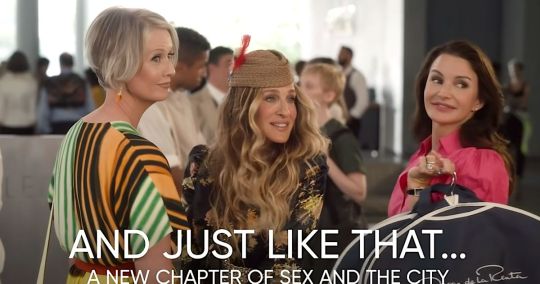
Some random thoughts on the first two episodes
-Why so little theme song? I was fully expecting for Carrie and the girls to strut down the New York City streets to their highly notable theme song composed by Douglas J Cuomo, or at least with an updated version of it, but we got nothing, but a straight shot to the opening scene at the restaurant. I'm guessing they chose to go this direction due to the signs of the times; because nowadays most shows don't have a full opening theme segment...so I kinda get it, but I still miss it.
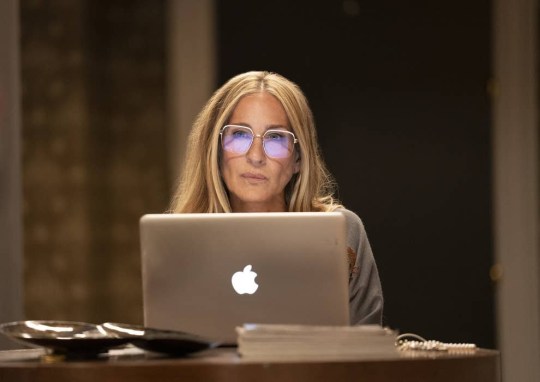
-The other right away surprise was the little to no Carrie narration. In the original show she is the voice of the series, from beginning to the end of each episode, however she's only narrated some short thoughts twice in these two episodes. She didn't even narrate what she was typing on her laptop, which is a classic Carrie thing to do. I wonder why they chose to take this direction...maybe they thought this would be a more mature approach to her character, to show that she's not as much in her head as she was before. Who knows....
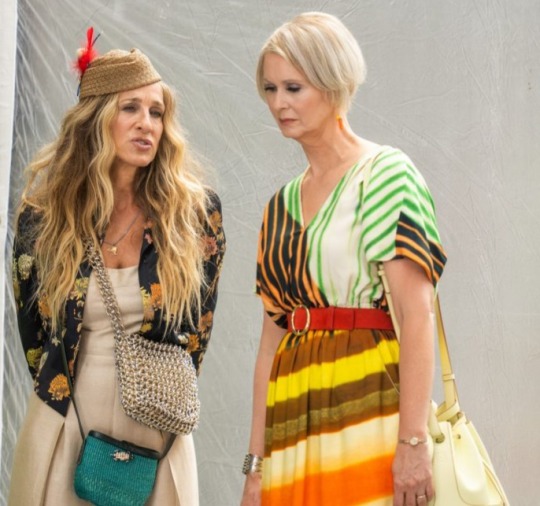
-The Samantha conversation between Carrie and Miranda seems very autobiographical. I wonder if Sara had any hand in writing that part. I desperately want to hear Samantha's side of things; cuz we all know she has the real tea of what went down between them.
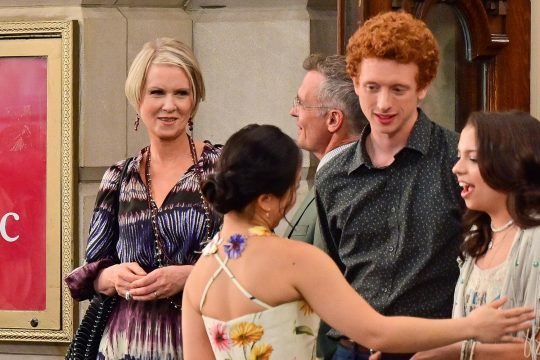
-I'm trying to gauge the timeline of this story because if it is taking place in modern times (and I think it is considering the covid references in episode 1) then the kids should actually be a bit older than they are in this current timeline. Brady should be close to hitting 20, since he was born in 2002, but Miranda said that he was actually 17. Some where some how theres been close to a three year gap unaccounted for....unless Brady wasn't actually born in 2002. We need the writers to clarify for certainty LOL
-The BIG issue...I've gotta be honest, I didn't really see many previews or read about what might happen on this reboot, so I was a bit surprised and disappointed when I saw that Big was back on the show. I guess I was hoping they would write the man off completely...I just do not like him. He treated Carrie horribly and for the most part it was a toxic relationship. But thankfully he didn't have much screen time & we didn't have to go through any potential emotional damage as he'd done in previous seasons (and movies) And as cold as this going to sound, I felt nothing when he passed away. TBH I was more moved when Lexi Featherston fell out the window. Either way, good riddance sir!
-So 20+ years later and Carrie, the famed sex & relationship columnist and now sex/gender role podcaster is still uncomfortable discussing....sex! And although I agree that the subject of public masturbation was a bit over the top in their delivery & the talk about Bradys sex life was cringe, you would think that with all her years of experience and being surrounded by sex positive friends, she wouldn't be so closed off with having open conversation about the act of sex. I've always found that dichotomy quite temperamental because here was this person airing out her and her friends sexual escapeds, but on the other hand her own personal views on sex were quite close minded & judgmental. Remember how Carrie reacted to Samantha's relationship with sex? Her rebuttals were all laced with slut shaming take downs (see the following pics) I hope the writers give her an arc where she finally grows comfortable having these open conversations because I refuse to believe that she stays stuck in her old 90s/early 2000 ways. And as she said "We can't stay who we were, right"....well let's hope that she is about it!

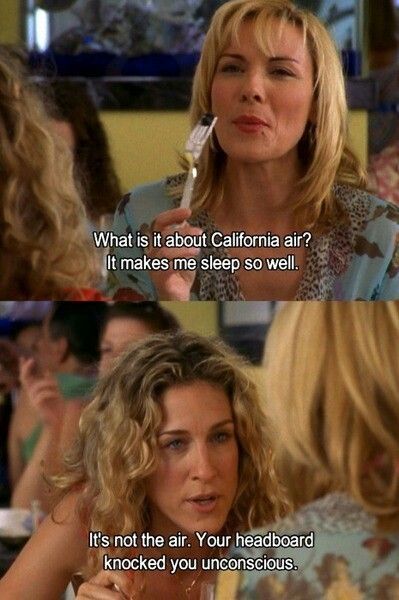
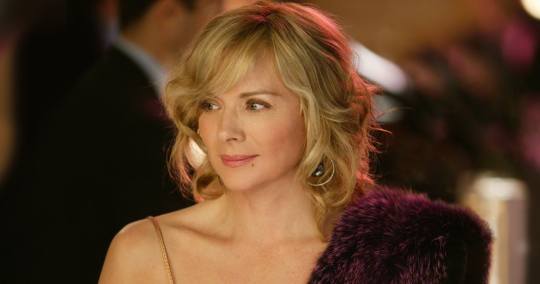
-It is beyond clear that Samantha's presences is very much needed. Her voice was such an integral part to the cohesiveness of this show. With out her it all seems a bit bland and one note. I know that it's extremely early to judge, but so far Carrie, Miranda and Charlotte's lives are not interesting enough to give the show the punch of flavor it got from Samantha alone. On the upside I'm glad the writers chose not kill her off and gave her an opening ending to her story. A big part of me wishes that they were all trolling us and a few episodes in Samantha will shows up in all her amazingness to save the show. If only.....
Predictions:
I belive Carrie's new love interest will be the silver fox hottie from the podcast; who I assume might be a producer or some sort of sound engineer on the show. We haven't been formally introduced to him, but we got several reaction shots from him during the interview with Carrie and that was enough for me to be convinced that a relationship was going to happen LOL
-A twist I sort of see coming is that Miranda might have a tryst with Che. I feel like the writers are going to slowly build that relationship up and somthing between them might happen. Of course I don't ship this because I LOVE Steve and I love Miranda with Steve, but I can see somthing happening on that end, later on in the season, which will bring major drama.
-It seems like Lisa Todd Wexley will be the new addition to the group. Looking forward to seeing what role she'll play within this storyline
-----‐--------‐-------------‐-----
Overall I liked the first two episodes. They weren't the best episodes from the SATC catalog but the show is watchable. Looking forward to seeing what the rest of the season brings.
#and just like that#sex and the city#carrie bradshaw#hbo max#hello its me#little black skirt#series premiere#sarah jessica parker#cynthia nixon#kristin davis#mr big#miranda hobbes#charlotte york#kim cattrall#samantha jones#chris noth#willie garson#stanford blatch#aidan shaw#john corbett#mario cantone#satc#Peloton
95 notes
·
View notes
Text
“Humans Burn Bright, but for a Brief Time”
Rewatching Season 14′s Ouroboros I was instantly struck by what I was feeling toward the beginning of the episode.

Cas and Dean are talking in the diner, with Castiel trying to get Dean talking about what he’s living with. Dean’s putting on a brave front about keeping AU!Michael locked away [closet themes], but facing his own mortality while Cas tries to take care of him. In fact, Dean is telling Cas that he wants Cas to kill him put him in the Ma’lak box before it gets too bad. The conversation is interwoven and played over Jack coughing up blood in the bathroom, secretly slowly dying.
It’s harsh. The whole thing suddenly smacked me in the face and I said to myself:
Supernatural didn’t do an episode that reached for the feeling of living through the AIDS crisis,
There is no way.
Right?
I thought this was too far of a stretch, I was making this up, I talked myself out of it. And then I kept watching ...

I watched as the queer coded monster of the week mostly killed only gay men.
I watched as they died because they hooked up with the Gorgon.
They show one victim take advantage of the Gorgon at a truck stop. They aren’t even subtle about it - the truck stop sign indicates it’s literally just called “Truck Stop”.

(The queer-coded Gorgon used to also kill women but says they’re careful now because of toxic masculinity. ... so the monster is actually Bi. Great. the writers do know what that is.)
TFW fights the Gorgon but he is only ever seen using his venom on his gay hook ups and Cas, only knocking Dean unconscious.

Dean is hit on the head and Cas and Sam bring him to the infirmary.
We have seen a lot of illness or deathbed scenes on this show and VERY few take place in the infirmary. But in this episode TFW worries over an unconscious Dean in an older hospital setting.
Cas and Jack have a conversation about mortality, about accepting the inevitability of death; dealing with the fact that the people they love, and specifically Cas’s partner Dean, are eventually going to die so they have to cherish the time they have with them, even though it's going to be short.

I felt crazy for even daring to think this could really be what I was watching, so I looked up the author of the episode and it was [drumroll please] Steve Yockey, Supernatural’s resident gay writer born in 1976.
Yockey brought us more than a few contenders for gayest subtext’d episodes of Supernatural, or rather those episodes that lay the groundwork for making Deancas canon including both Banes episodes, Lily Sunder, & Advanced Thanatology. He is also 45 which means he was a teen at the height of the AIDS crisis, and was 20 years old in 1996 when Rent came to Broadway and the US saw a decrease in deaths for the first time after the exponential climb.
It was a scary time to be gay, and a scarier time to be out. There was incredible secrecy and shame to the diagnosis. People had to watch as their friends and family got impossibly sick, knowing it was a death sentence.
Luckily, that is no longer the world we live in. We live in a world where we know what HIV is and how to protect ourselves from it. Where medications mean HIV is a condition and not a sentence. Where PreP and Truvada mean protection from contracting the disease, and mean patients could carry a near zero viral load, so they don’t get sick or spread the disease to their partners.
We face a new epidemic today, a pandemic actually, but we can’t forget our history. The last epidemic we faced decimated one segment of the population in particular and so people were left to deal with it alone, or, if they were lucky, with their found families. It was ignored, treated as a punishment, got no funding or public awareness campaigns, until it did. We shouldn’t forget.
Supernatural so often dabbles in the flirty side of queer coding. We pass GIFs of Dean checking out army dudes, or Crowley making amazing one liners. I think that Steve Yockey, though, slipped one by us, past the network, past the general audience, and told another side of the story, of the experience, of being queer in America that would have been experienced a bit more by someone Dean’s age, or more so a bit older.
Was this intentional? A case of an effect of growing up during a crisis worming it way into your writing without realizing it? Not actually in the episode at all?
At this point I think that yes, Yockey intended it.
But I want to hear what you think so please share your thoughts.
#dean was always bi#spn queercoding#spn meta#deancas#steve yockey#destiel#spn metaphors#spn feels#castiel#hiv representation#queer representation#ouroboros#fav#aids#spn rewatch#spn 14x14#original content#spn#gay gorgon#aids allegory#gorgon#I swear I have fun metas and fun content but then I go and do this too#queer themes
477 notes
·
View notes
Text
The Supernatural Finale’s Nullification of the Symbolism of the Road: Dean Winchester lived as a progressive hero and dies as a static shadow
During the emotional height of its grand finale, Supernatural’s Dean Winchester ensconces the show’s earlier themes as a road narrative by showing an elongated montage of him driving his classic car along an endless, American road. By returning to the original mythic and intertextual narratives from which Supernatural was born, the finale entrenched within its themes the grand myth of the freedom of the American road. However, this grand myth and symbol, representing the traveller’s metaphorical journey towards inner freedom and self-discovery whilst exulting their newly found connection to the beatific landscape on Earth, placed within the context of heaven - is rendered redundant.
Without canonical material to provide a true world-building of this new heaven, we must rely on the idea of heaven from previous seasons, as well as extratextual narratives of heavenly realms. The audience is told that in this new heaven, souls have freedom and new memories may be created. The vision we see of the finale’s heaven is glowing, sanitised, and idyllic. Coupled with the general Western audience’s presupposition that heavenly realms within texts will be devoid of true horror or suffering, we are to assume these new memories and freedoms will also be heavenly and devoid of suffering. This assumption is bolstered by the appearance of The Roadhouse, Bobby Singer, and Baby, all representative of ‘good times’ and shot with soft lighting (peaceful), then juxtaposed against Dean’s dark, gritty, violent, and horror-filed final moments on Earth. This entrenches the message that Supernatural is sending: Dean is at peace and saved from his suffering.
This disallowance of suffering in Dean’s heaven is antithetical to the myth of the road: the metaphorical journey towards inner-freedom, ‘self-display, and self-discovery’[1]. Conflict, suffering, and trials are essential towards self-discovery and character development, and this is truer for the ‘hero’ protagonist than others. Dean, our hero, in his sanitized heaven is now in stasis. His external goal of defeating god is destroyed, and his internal journey (created by reacting and responding to the trials and tribulations of a varied life) is curtailed. His symbolic drive through Americana heaven has been stripped of its meaning. Our hero is no longer a hero of the road and his journey of self-discovery is terminated. Kris Lackey in RoadFrames: The Amerian Highway Narrative, writes that ‘Car voyaging remains a symbolic gesture, describing in spatial terms a character’s education in or flight from domesticity’[2]. Whilst Dean is spatially driving away from home/Earth, his character is deprived of the ability to progress or to be educated by his surroundings, and therefore Dean’s drive through this physical space has been stripped of its metaphorical meaning. The physical road of heaven is illusory: it’s symbolism only taking on meaning and worth when the traveller changes in tandem with the view from the car window. The view from ‘Baby’ may change, but Dean cannot.
American road narratives have long set themselves against the urban. Following in the footsteps of Transcendentalism, in particular Thoreau’s Walden, the road symbolises a rejection of materialistic and capitalist society and a return to the land. The urban and the road are set in comparison: the urban taking on meaning as a place where one lives as a shadow and lives a half-life in a modern hell, stripped of connection to the Self and to others. The road thus takes on the meaning of a place where one can live fully, where, as Thoreau writes, one can ‘live deliberately, to front only the essential facts of life, and see if I could not learn what it had to teach, and not, when I came to die, discover that I had not lived.’ [3] The road is thus an allegory for living with heightened experiences, living life fully, and rediscovering a more meaningful human experience through a greater connection to the land. Dean’s heaven road is not in opposition to the urban. Heaven is not a place where one can live deliberately and learn from the joys and pains of human life. The land, a peculiarly Earthly notion, can only ever be absent in Heaven. The essential nature of Heaven and Earth is that they are wholly separate. Each of their meanings is derived from the fact that they are not the other. The myth of the road is so inherently connected to the land on Earth, that transmogrifying it into a realm which has always defined itself as ‘not of Earth’ yet again nullifies any symbolic meaning attributed to ‘the road’.
This inability for character development, an inability to learn from the land, and an inability to learn from the suffering of an Earthly road renders our hero stuck, with his life suspended. In On the Road, ‘Kerouac’s Sal Paradise and Dean Moriarty… exemplify the surviving type - outsiders whose hardscrabble road-lives fit them for roles as satirists and enemies of settled bourgeois life.’[4] Dean, whose character is based on Dean Moriarty, whilst visually drives a car in heaven and is seen as always moving forwards, Dean himself is completely settled in his current reality – unable to move forward in any way other than physically. Whilst Sam and the people left behind on Earth are able to move on, Dean, as he ironically speeds through heaven’s roads is now stuck in the same place forever.
On the Road’s message is one of a rejection of a settled, domestic, and stultifying bourgeoisie life. The semi-autobiographical nature of the work allows us to interpret the text in connection to Kerouac and Cassady’s real life. Whilst this anti-domestic theme is ingrained in Kerouac’s text, Kerouac himself ended his years living with his mother, having stopped travelling. When comparing Kerouac’s later life with his protagonist’s youthful life in On the Road, we can make a case that youth is inherent to contextualising the book’s central themes, most importantly: the theme of freedom. With the characters and writer in their 20s, this novel resonates with the youth. Their youth calls for a rejection of the domestic and of the settled. Likewise, Sam and Dean’s earlier years before they move into the bunker are, and should be, seen as a rejection of the domestic and settled. Thoreau’s Walden, Krakauer’s Into The Wild, Ruess’ A Vagabond for Beauty, Kerouac’s On the Road, Cheryl Strayed’s Wild, Ben Reitman’s Sister of the Road – these, along with the majority of road narratives (both literary and on-screen) are populated with protagonists in their 20s. Had these seminal road narratives had protagonists in their 40s, as Dean Winchester is in the finale, the message of a life on the road would be incalculably altered. Whilst the youthful Sal and Dean in On the Road choose to reject a settled life for a vagabond’s, the middle-aged Dean Winchester is forced from a settled life in the bunker (a home that he cherishes) into a vagabond’s life on the road. He is thrown into a road narrative which brings joy to younger protagonists as it did for him in his 20s, however since the age of 34 (roughly) when him and Sam find the bunker, he as a character no longer sought out this life of the road. Their father’s (John Winchester’s) nomadic life which moved him from one dark and dingy motel room to the next was portrayed as somewhat sad, a sacrifice, and a life he was forced into once his domestic life literally went up in flames. John Winchester’s nomadic life started when he was 29 years old and has never been representative of the careless freedom of the road. Like John, symbolising Dean as being back on the road is somewhat sad and reads as a form of hollow nostalgia for the freedom of youth. Dean’s drive on heaven’s road and its rejection of the domestic no longer reads as youthfully liberating and bold, but tragic that he is forced from his age-appropriate domestic home into an unsettled life that he wilfully moved on from in season 8. As viewers, we must ask ourselves if it is still freedom if one is forced to be free? Whilst I could delve into the writings of Isiah Berlin or Rousseau’s writings on the ‘social contract’, Supernatural in many ways answers this question itself. In the fight against an interventionist god, our characters (self-named as ‘Team Free Will 2.0’), believe that one’s ability to choose their path in life is the ultimate freedom. If god had forced their freedom, they would not consider that as true freedom. Therefore, the symbolism of the writers forcing Dean from the domestic and back onto the freedom of the road cannot be read as true freedom. He had no choice.
Supernatural’s finale aimed at recapturing the tone and themes of its pilot episode, and consistently mirrored shots, costume, locations, dialogue, and themes of the pilot. It used visual signifiers to play into the show’s earlier mythology. However, the unintended consequence of this visual and narrative symbolism forced the character of Dean into trying to recapture his youth. Dean had moved on from the open road since the pilot, however the resounding mythic image during Dean’s final screen-time is him on the road. In the end, ‘Carry On’ unintentionally satirises its own mythology. It is less like On the Road, and more like Easy Rider. David Laderman writes of Easy Rider, ‘At a certain point down the road, the road movie’s glorified mobility seems to yield a disillusioned attitude in the protagonists, who have been unable to truly escape, and who have internalized the pressures of conformist society.’[5] Easy Rider’s protagonists, maddened by consistently defining themselves by the road realise that the search for such a freedom from a violent and conservative nation is futile. The hippie dream, in the context of the Martin Luther King assassination as well as the other assassinations and the war in Vietnam, was dead by 1969. After the traumas faced on the road, the protagonists are confronted with the knowledge that ‘the initial promise and thrill of mobility gradually turns sour.’[6]So too is Dean now unable to escape his previous life on the road and his new life on heaven’s road.
As a character who canonically repressed emotions and played into hyper-masculine traits at the expense of the catharsis of emotional vulnerability, like Easy Rider’s protagonists, Dean never escaped his internalised ‘pressures of conformist society’ before his death. With no trauma or challenges to confront on heaven’s road, Dean can never go on the internal journey to free himself from his repression. Heaven’s road will never help him free his Self. On the Road’s protagonist, Dean Moriarty is based on Neal Cassady who was a bisexual man and his relationship with poet Allen Ginsberg was written about within Ginsberg’s work. Dean Winchester was also based on Neal Cassady, giving some credence to viewers of Supernatural who have long read Dean through a queer theory lens, and presented him as bisexual. Through this bisexual reading, Dean’s inability to find true freedom on heaven’s road becomes allegorical to his inability to free himself from his repressed sexual desires. Like On the Road’s omission of Dean’s bisexuality, Supernatural can be read as doing the same. Increasingly, freedom is stripped from the symbol of heaven’s road. Both Neal Cassady and Dean Winchester die at the same age of 41.
Road movies and their mythology combine both conservative and progressive ideologies, and many try to walk this line without politicization. The myth of the road can be read as inherently conservative and patriotic as it plays into the American ideology of frontierism and individualism. Yet the mythology of freedom from the suburban/urban and the incorporation of road narratives into progressive counterculture (such as the Beats and the Hippies) makes the genre appear liberating. By setting itself in juxtaposition against capitalist and urban life, road narratives appeal to the progressive, and many of the genre’s protagonists are indeed progressive.
As outlined earlier, Dean’s return to the road does not feel freeing or liberating. His journey on the road does not include a Merry Prankster-esque or Easy Rider LSD binge, nor a stop for a wine-heavy jazz night, nor a Neal Cassady-esque exploration of his sexual needs and desires. Like heaven itself, this road trip montage is sanitized, pure, and holy. This sanctity and purity of heaven’s road highlights the nationalistic mythology of America as a promised land, anointed by god himself, and above all others – the Pilgrim’s ‘city on a hill’. Whilst the audience can assume that heaven is supremely American because it is Dean’s heaven, it is difficult to intellectually separate your thoughts from what Supernatural is so powerfully visually telling us: heaven is America. By placing such strong (even if unintentional) nationalistic symbolism alongside the knowledge that John, Mary, and (soon) Sam will be central to Dean’s heaven, Supernatural marries two resolutely conservative American values: the heterosexual nuclear family, and god’s promised land of America – his heaven on Earth. This firmly aligns the mythology of the road closer to its conservative symbols, than its progressive ones. Perhaps such patriotic symbolism wouldn’t read as harshly when the pilot aired in 2005. Yet during the staunchly bipartisan Trump years where examples of white supremacy, violent jingoism, and xenophobia are rife, a departing message of an American heaven and the importance of a heterosexual nuclear family can be easily politicized and be seen as bolstering the patriotic symbolism which it draws upon.
A large majority of Supernatural’s fanbase (as oppose to general audience) is composed of young, progressive, and queer women. Supernatural’s narrative themes of found family and Castiel’s declaration of homosexual love engendered a sense within its audience that the series was narratively leading towards the progressive finale. Yet the patriotic road trip montage, the knowledge of Dean’s return to his nuclear family, and Sam’s montage of living out his life in an apple-pie, baseball throwing, middle-class house, heterosexual nuclear family lifestyle sans his deaf love interest (a montage more akin to the Raegan-era nostalgia films of the 1980s than anything made in 2020), tonally, visually, and symbolically reads as a finale steeped in conservative and Republican mythos. These are particularly tonally jarring for Supernatural’s progressive audience, especially after the promise of queer representation, disabled representation, and themes of a found family that were prevalent just two episodes previously.
In conclusion, Supernatural returned Dean Winchester to his road trip routes, yet divorced from his youth or an ability to progress as a character, the progressive symbolism of the road was nullified. By ripping him away from his desired domesticity and forcing him onto the freedom of the road, his deepest desires of a settled life and the freedom of choice were also destroyed, therein destroying his character arc. Supernatural, therefore, strips the progressive symbolism of freedom associated with the road and further sanitises and sanctifies it by placing ‘the road’ in heaven. We are left with a pure road, America as god’s land, the elevation of the importance of a nuclear family, and a nostalgic montage of Sam’s conservative life. Dean’s road is now imbued only with the conservative aspects of it the symbol’s mythology. For an audience in 2020 seeking progressive representation in the jingoistic years of Trump, to be confronted with staunchly conservative ideologies and symbols (which appear even more extreme than when first broadcast in the Bush years of 2005) there is no cathartic nostalgia to be had.
‘We laugh, at the [road trip] movies, at the frequency with which the hero goes ‘out there, away from all this’ to ‘find himself,’[7]but there is nothing for Dean to find at the end of heaven’s road. He is frozen forever in unchanging happiness – a hero deprived of a journey. And so Supernatural ends with Dean on the road, the camera portraying with powerful imagery a hollow and tragic myth, completely stripped of its progressive meaning. With socio-political and character context changed, Supernatural’s return to the pilot unintentionally satirises itself, and alienates a fan base who define themselves against the ultimate message of the finale: heterosexual nuclear family, and white national chauvinism.
I finish with Allen Ginsberg’s words in his poem Elegy for Neal Cassady, written after hearing news of Neals death at the age of 41.
OK Neal
aethereal Spirit
bright as moving air
blue as city dawn
happy as light released by the Day
over the city's new buildings --
[...]
Sir spirit, forgive me my sins,
Sir spirit give me your blessing again,
Sir Spirit forgive my phantom body's demands,
Sir Spirit thanks for your kindness past,
Sir Spirit in Heaven, What difference was yr mortal form,
What further this great show of Space?
Speedy passions generations of
Question? agonic Texas Nightrides?
psychadelic bus hejira-jazz,
Green auto poetries, inspired roads?
Sad, Jack in Lowell saw the phantom most --
lonelier than all, except your noble Self.
Sir Spirit, an' I drift alone:
Oh deep sigh.
[1] Leed, Eric., The Mind of the Traveler, (1991), p. 13.
[2] Lackey, Kris., RoadFrames: The American Highway Narrative, p. xi.
[3] Henry David Thoreau, Walden and Other Writings, p. 172.
[4] Lackey, Kris., RoadFrames: The American Highway Narrative, p. 8.
[5] Laderman, David, Driving Visions; Exploring the Road Movie, (Austin, University of Texas Press, 2002), p. 76.
[6] Laderman, David, Driving Visions; Exploring the Road Movie, (Austin, University of Texas Press, 2002), p. 76.
[7] Lackey, Kris., RoadFrames: The American Highway Narrative, p. 92.
If you would like to read more about my writings on Beat literature and Supernatural, you can find them listed under my tag ‘Cas x Ginsberg x Buddhism’ . If you would prefer to have a PDF version of the above essay (is this an essay? i feel like it accidentally became one lol), then just let me know and I can send you that file. I wrote this this afternoon and feel like I have a lot more to say on this whole thing and barely touched upon lots of ideas that arose when I was writing this. I decided to stick firmly to the road symbolism stuff rather than bombard you with more than 3000 words in one go.
Thank you to @drsilverfish and this post of theirs which inspired me to revisit my Supernatural/The Beats tag, so thank you and you should all read that wonderful post.
I started off rambling with this and then I decided to turn into into something of hopefully some worth and put effort into thinking over what I was trying to say. Do let me know if you want to to expand on anything I wrote here, and my asks are always open for questions. Let me know if more of this may be of interest.
#cas x ginsberg x buddhism#ON THE ROAD#supernatural and on the road#supernatural and the beats#supernatural and beat literature#spn#supernatural#supernatural finale meta#my supernatural meta#supernatural meta#bi!dean meta#literature and supernatural#spn as a road narrative#road narratives#symbolism in spn#supernatural finale#15x20#spn finale
828 notes
·
View notes
Text
Claudia Jessie: ‘What’s the appeal of Bridgerton? It’s a sexy cuddle’
The actor on growing up on a canal boat, her noisy Buddhist chanting and what’s next for her character, Eloise
Sun 20 Mar 2022 09.30 GMT
Claudia Jessie Peyton, 31, was born in Birmingham and raised on a canal boat by her mother. She was home-schooled and has no formal qualifications but was talent-spotted while trying standup and recruited by a local theatre company. Her TV roles include Line of Duty, Doctor Who and Vanity Fair. She plays Eloise, the eponymous family’s second oldest daughter, in the hit Netflix period drama Bridgerton, which returns on Friday.
Where do we find your character Eloise as Bridgerton returns?
She’s making her debut on the London social scene. Anyone who’s a fan of the show can probably predict how she responds – with gritted teeth and many an eye roll. Eloise is only 18; I’m 31 and can barely respond to text messages, let alone be presented to the Queen, then ultimately married off. Finding love isn’t even in her top 10 list of desires. She wants autonomy, to earn her own money and make her own choices.
Is she a proto-feminist?
Hers is the explicit feminist narrative throughout the piece. It’s skilfully peppered throughout all the characters, with even the boys questioning their roles, but Eloise is the one who’s got a megaphone, shouting: “This is rubbish!”
We see her reading Mary Wollstonecraft in the early episodes. Are you a bookworm too?
I’ve always had my head in a book. I’ve just invested in a secondhand Kindle, in fact, because I live on a canal boat and I can’t just keep adding to my book collection or we’d sink.
What were your formative books?
One of the first books I remember being given was Little Women by my nan. I read that six times in rapid succession. I’m a member of Extinction Rebellion, so went through a big George Monbiot phase. I also read Japanese authors like Ryu Murakami. In the Miso Soup is the darkest novel I’ve ever read. One chapter gave me palpitations.
Bridgerton became Netflix’s top show in 76 countries. What’s the appeal?
It’s not bleak or dark or intense. It’s a bit of a cuddle. A sexy cuddle, mind you, but a cuddle nonetheless.
Will Eloise get her sexy moment?
I wonder what that would be like? A sexy-but-funny montage, maybe. It would be cool to see Eloise awaken and get in touch with that side of herself. In season one, she didn’t even know how babies were made.
Eloise is best friends with Penelope Featherington, played by Nicola Coughlan. What’s your relationship like off-screen?
Nicola always says it’s the other way around. In Bridgerton, Eloise talks at Penelope a lot of the time; in real life, I’m more introverted and Nicola does most of the chatting. We were the first two people cast. I remember seeing our head shots next to each other on a wall and thinking – “Cool!” – because Nicola’s incredible.
Didn’t Nicola stab you with a parasol during your first scene?
Correct, she drew blood. Nicola had heels on and kept falling over. I tried to catch her and the silver spokes of the umbrella went bosh, straight into my hand. I managed to keep it away from my costume but bloodied my white glove. It was a blood oath. That’s why we’re so close now.
What do you make of Eloise’s big queer fanbase?
I can see why she connects with people, because she’s one of a kind within the show. She’s quite modern, so closer to the audience in attitude and spirit. It’s beautiful that the queer community identify with her. But I don’t experience a lot of the love because I’m not on social media.
Why not?
It’s my Kate Bush inclinations to be slightly reclusive. When I figured out I wanted to act, that became my mission. But there are parts of the industry that don’t chime with my natural disposition. In order to maintain happiness, I have to eliminate certain things. With my anxious tendencies, it wouldn’t bode well so I steer clear.
Eloise never looks comfortable in her finery but do you enjoy wearing the regency costumes?
I mean, it’s the nicest I’ll ever look. I’m not a fancy dresser at home. Living on a boat means I get covered in oil, coal, wood chips, dust, canal water, diesel. There’s no point dressing up, so I love getting to do it on-set.
Is it true that you only wear secondhand clothes?
It’s six years since I shopped on the high street. I’ll buy new underwear but ethically sourced and mostly recycled materials. Otherwise, it’s strictly thrift and vintage shops.
What’s the appeal of living on a boat?
I loved it as a kid and that stuck with me. When I moved to London, I lived in various terrifying places, scraping money together for rent. I thought I’d never get a mortgage for a house so started saving, slowly but surely, for a canal boat. It’s one of the best decisions I’ve ever made. I love cruising, the small spaces, the smell of the engine. It’s all I’ve ever wanted.
You were raised by a working-class single mother. How did that shape you?
It’s about expectations. Mine were never high. I worked very hard but never expected to make it. Even now, I leave auditions and think: “Well, I’m clearly not going to get that.” When I do, I’m pleasantly surprised. My mum cleaned houses to pay for my dance classes or music lessons or my brother’s activities. She’d do anything so we could have a shot. I’m very aware of where I’m from and how hard life can be. That will never leave me. It’s also made me a nester. I don’t want for much; I love just pottering around on the boat.
How come you were home-schooled?
School wasn’t a nice environment for me; I had a hard time. I left at 14 and my poor mum home-schooled me while doing cleaning jobs. She’d teach me maths while ironing someone else’s clothes. Remarkable, really, but I learned better one on one, away from social pressures.
Is there a class gap in the acting profession?
Growing up on a canal boat or council estate, I wasn’t going to the theatre. An acting career never crossed my mind. It’s hard to have beautiful dreams when you’ve got to focus on earning money, paying rent and practicalities. But those voices are important. Expressing yourself and having an emotional outlet is so valuable. I didn’t train, don’t have any qualifications, didn’t make all the right choices. It’s against the odds that I’m here now.
You were Thandiwe Newton’s sidekick, DC Jodie Taylor, in Line of Duty. How was that?
When it aired, my friend sent me an article titled: Why DC Jodie Taylor is just the absolute worst! [laughs]. I love Thandiwe. We’re still in contact and she’s a beautiful woman. And I learned so much from Vicky McClure’s ability to be so naturalistic. [Showrunner] Jed Mercurio would tell me: “Don’t really act, just say the words.” That taught me to rein it in.
What role does Buddhism play in your life?
I’m one of the noisy Buddhists. I don’t meditate, I chant – “Nam Myoho Renge Kyo”, the same as Tina Turner. Me and Tina T, no big deal. I did it as a kid with my mum and auntie but found it awkward when I hit my teens. Then I was 17, very sad, struggling with my brain, and my auntie was like: “Right, let’s commit to chanting.” It made me feel better and I haven’t stopped since. It’s the anchor of my life. I wouldn’t be here without it. Now I have responsibilities within the Buddhist community. I look after all the young women who practise it across the Midlands. It’s a job I do very gladly.
What projects are in the pipeline for you?
I can’t talk much about it yet but I’m going to Sydney for two months, working on something I’m very excited about. Let’s just say it’s very different to Bridgerton. Then I’m back for Bridgerton season three.
Are you signed up for season four as well?
Hope so! I think I am. There’s much more to come from Eloise, so I’m definitely sticking around.
Bridgerton season two streams on Netflix from 25 March
https://www.theguardian.com/tv-and-radio/2022/mar/20/bridgerton-claudia-jessie-eloise-interview?CMP=twt_a-culture_b-gdnculture
20 notes
·
View notes
Text
Things from Anne with an e that I feel like writing down
Season 1 Episode 6: Remorse Is the Poison of Life
1. Diana having to run through the dark with nothing but a lantern and quite reasonably tripping. I never really thought about how dark it would actually be out because there’s always light.., somewhere in a modern city. It’s dark but you can usually still see
2. Every time Anne and Diana are separated they end up reunited during some great tragedy and are like “I missed you so much!!” Like yeah that’s great but. Please focus
3. It’s terrifying how easily children could die before modern medicine. They still can die very easily and that’s still terrifying but back then there was no quick fixes or easily accessible help
4. “It’s an old wives tale.” “I might be one but not the other. Evidently one doesn’t have to be either thing to know it.”
5. Anne knowing how to treat croup because all of Mrs. Hammond’s sets of twins had it
6. “I was supposed to be a boy but when I wasn’t, they decided to keep and raise me.” “How extraordinary!”
7. Minnie May almost choking to death on her own phlegm and Anne ultimately saving her because there’s no way the doctor would’ve made it all the way from Soencervale in time
8. “I believe I need a brandy.”
9. It’s really interesting how much of the script comes straight from the book
10. “I’m so glad I live in a world where there are white frosts, aren’t you?”
11. John Blythe’s love for adventure and how Gilbert undoubtedly sees it in Anne
12. Eliza apologizing for how she misjudged Anne
13. “My darling Diana”
14. “I can’t tie myself down to anything so unromantic as dishes at this thrilling moment!”
15. “Even aunt Josephine said she’d like to see you again, and she doesn’t like anyone.”
16. “Shes disinclined to stay home alone since her companion passed away.” “Her companion?” “Her best friend forever and ever.”
17. “Aunt Josephine never married. Neither of them did, they lived with each other their whole lives.” “I’d live with you forever if I could. But I know you’ll leave me the date you get married to some wealthy and handsome gentleman. I hate him already.” “How’s Gilbert?”
18. “It’s very likely Gilbert’s father isn’t going to get well, so it’s more than possible that when Gilbert finally comes back to school… he’ll be an orphan.”
19. The cut from that conversation to John Blythe’s funeral
20. Matthew grabbing Marilla’s arm because he knows how much john meant to her
21. Gilbert watching the snowflakes melt in his hand
22. Marilla’s flashback
23. Young Marilla teasing john
24. Him giving her the same hair ribbon she later gifts to Anne
25. Anne and Gilbert being just like their parents, mirroring their romance and yet achieving the love Marilla and John could never have
26. Anne trying to make Gilbert feel better but making it seem like it’s about her. I often find it hard to articulate my relation to others in a way that does sound like I’m relating and not like I’m making it about me
27. Aunt Josephine on a stroll in the woods
28. Anne’s ranting about her “extensive knowledge of being an orphan”
29. Her calling Gilbert a dumb boy and refusing to think about him
30. “Romance is a pesky business. No sense to be made of it.”
31. “May I enter your humble abode.” About Anne’s run down little shed
32. “I couldn’t be less interested in Gil- that boy!”
33. “Let your ambitions and your aspirations be your guide.” “But I have so many!”
34. “I’ve always wanted to be a bride, but I don’t really expect to be a wife.” “Interesting!” “So you see the conundrum.” “I do. I have the following thoughts to offer. First, you can get married any time in your life, if you choose to do so.” “That’s true-“ “And two, if you choose a career, you can buy a white dress yourself, have it made to order and wear it whenever you want.” “Why didn’t I think of that!? I love that idea! I’m going to be my own woman!” “I’m a proponent for making ones own way in the world.”
35. “If you become a doctor, perhaps you can discover a cure for old age.”
36. Anne calling aunt Josephine her new role model, as well as Marilla and Matthew
37. “I’m going to be the heroine of my own story.”
38. Marilla finding an old letter from John
39. The theme Unrequited Love playing during this scene
40. It’s fascinating when you come to recognize the instrumentals by name, the names actually have a lot of double meanings in relation to the show. Fire in The Town not only plays when there’s an actual fire, but also when Anne’s rumors about prissy set the town ablaze
41. “If the key to a mans heart is through his stomach-“ “Which it is!” “Then, we have to make sure that this is the best shepherds pie that Gilbert has ever had.”
42. Anne wanting a boy to loved for her brain and personality rather than her abilities to keep a home
43. “Don’t you think Gilbert looks even more handsome now that he’s sad?” “I didn’t notice.”
44. I just noticed aunt Josephines mourning clothes, I know she was grieving but I didn’t put two and two together
45. “Take the boy the godforsaken pie before I suffer a mental collapse.”
46. Anne rambling excitedly about Jane Eyre.
47. Anne almost spoiling the book, just like Gertrude used to do
48. Anne suddenly breaking down over death. I’ve done that before, far more frequently in middle school when I realized that we all die someday
49. “It must be awful beyond measure to lose someone that you love deeply. In a split second, a heartbeat, they’re gone forever… and there is nothing you can do to change it or bring them back…”
50. “Anne? You’re crying on the potatoes.”
51. “There’s nothing wrong with saying ‘I’m sorry for your loss’, Ruby. And I’m going to say it because I am.” “You’re just going to make it worse if you say that. His father!! Just died!!!” “That’s what people say when someone dies.” “I don’t want you to upset him.” “He’s already upset because his father just died!”
52. “We hope you like shepherds pie.” “Everyone LIKES shepherds pie 😡. We hope it’s a comfort to you, Gilbert.🥰”
53. Anne telling “but I would make a terrible wife!” And running out.
54. Matthew offering to help Gilbert get his farm back in order
55. Gilbert not wanting to be a farmer but having an entire farm shoved off on him when his only family does, despite being… 14 at most? 15 maybe?
56. Matthew losing all his crops when the Dal Marie sank
57. Billy wanting Gilbert back to control the “ugly orphan” and Gilbert defending Anne
58. “She’s smart, deal with it.”
59. Gilbert telling billy to read a book for once
60. “I’ll give you a tip, okay? I’m not your bud. And if you ever hassle Anne again, you’ll regret it.”
61. “What’s your problem?” “Ask me that again. No, seriously. Go ahead.” “Why you gotta be like that?” “Ask me!” “…what’s your problem?”
62. Gilbert throwing his stuff at billy to preoccupy his hands and THEN punching him straight in his stupid face
63. The boys are fighting!!!! And rolling around in the snow too that’s kind of funny looking
64. Gilbert beating billy in that fight
65. Marilla telling Gilbert about his father
66. All of Gilbert’s siblings died
67. Gilbert’s father taking him to Alberta before he died, where Gilbert was born
68. “You resemble him in many ways.”
69. “He asked you to go?” I’ll always be grateful to him for thinking I’d be brave enough. Obligation… can be a prison.”
70. Anne trying to write a letter to Gilbert apologizing for what she said
71. Anne visiting aunt Josephine for advice and accidentally interrupting her grieving
72. “Emotion is rarely convenient and often intolerable, but I find at the moment that I don’t mind it.”
73. “Grief is the price you pay for live, you see. So it’s alright.”
74. “You and I are not the marrying kind.” “Ah, but I was, in my way. And we had a full and wonderful life together, and I gave no regrets. That’s all you really have to decide Anne, to live a life without regrets.”
75. Anne kissing aunt Josephine on the cheek and running off to live said life
76. No Matthew don’t make that loan deal!!!
77. Anne sprinting to Gilbert’s house bit for the first time of many to come, being too late to reach him.
#anne with an e#renew awae#awae#anne shirley cuthbert#gilbert blythe#josephine barry#marilla cuthbert#mathew cuthbert#diana barry
58 notes
·
View notes